#she has seen that scene in Saltburn
Explore tagged Tumblr posts
Text
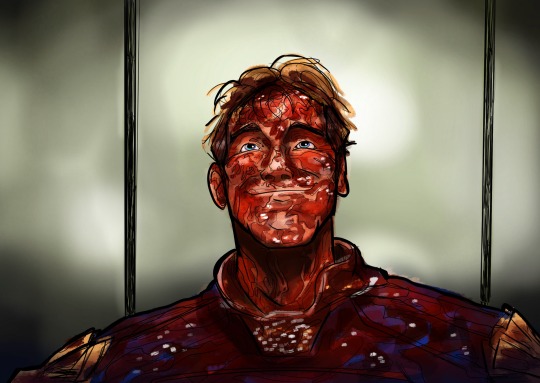
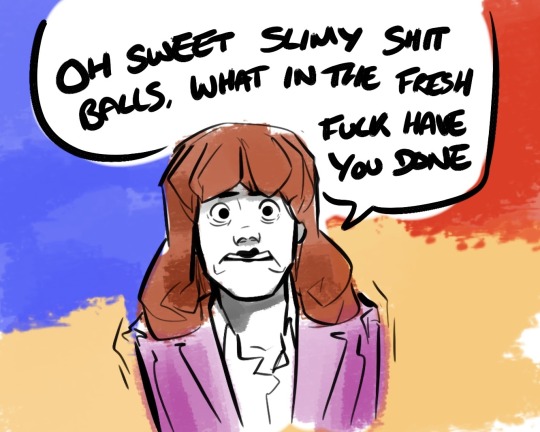
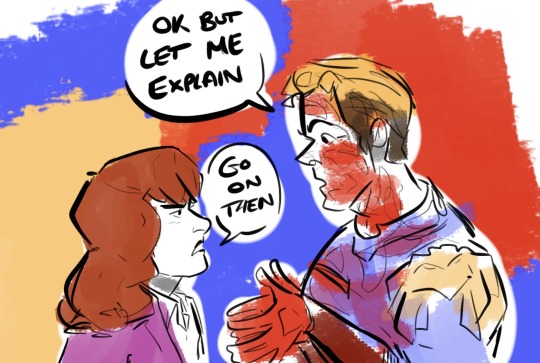
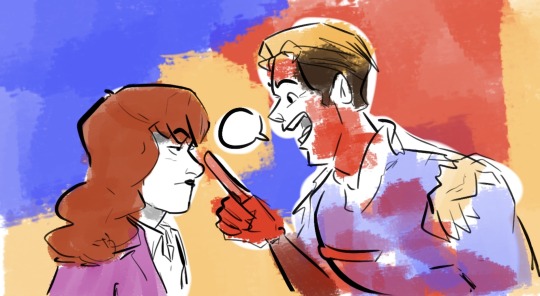
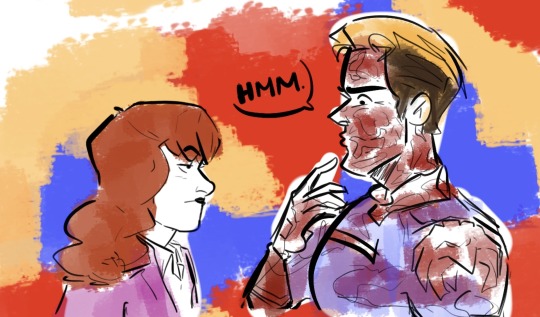
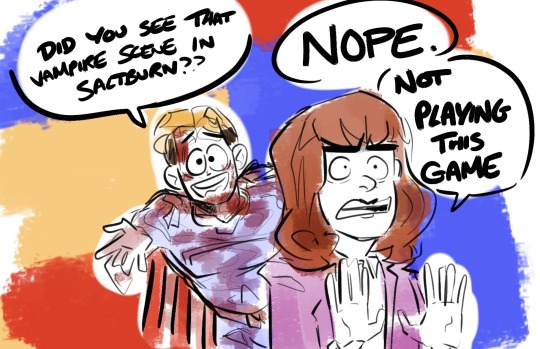
Newest drawing!! I will never not draw Ashley where I can
#the boys#the boys tv#homelander#the boys homelander#the boys ashley#ashley barrett#she has seen that scene in Saltburn#they watched it together to teach him the zeitgeist that he refuses to read every month#why the fuck did nobody tell me drawing was easy when you use reference???#I’ve been so jealous of so many people who can draw him so he looks like him and the second I use reference it’s easy as FUCK#this is ridiculous
330 notes
·
View notes
Text
i need to talk to you guys about the colors of the Cattons (Felix specifically) and Oliver. the clothes they are wearing are telling the story of Oliver taking over and leaving his mark throughout the whole movie, with Oliver's failures and successes and a final triumph. holy shit. get in. this is long and ends in ancient greek culture trivia. let;s talk please.
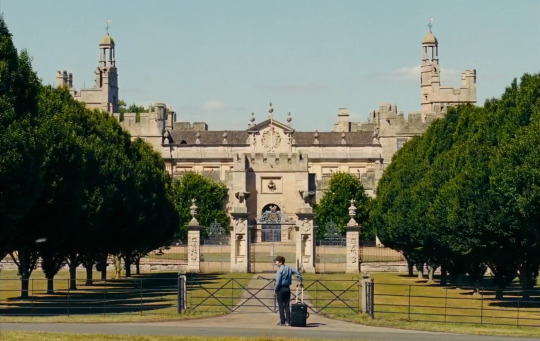
disclaimer: am starting from Oliver's arrival at Saltburn. before that the outfits are also very intentional, but it's a lot more complicated and it has been discussed before. the world distorts once we are at Saltburn and the story gets truly gothic there, and every detail—including color!—is enhanced in meaning. also, special thanks to @kivlaro for doing this with me, the thoughts on this specifically and the Saltburn craze on the whole. pics and detailed analysis under the cut!
let's start from the beginning. here is Oliver at the door. simple, blue shirt.
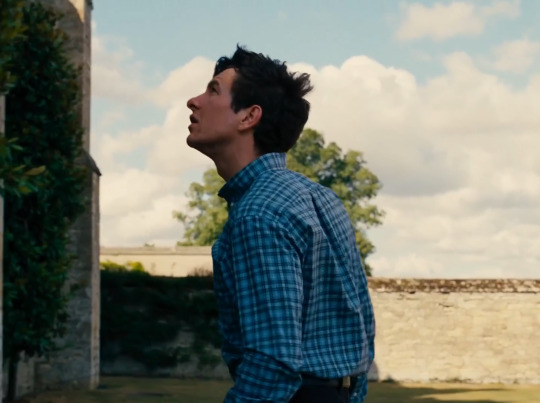
the shirt is sort of its own character. logically it makes sense as Oliver's suitcase is small and he spends the whole summer there, of course he'll rewear stuff a bunch. but it is blue.
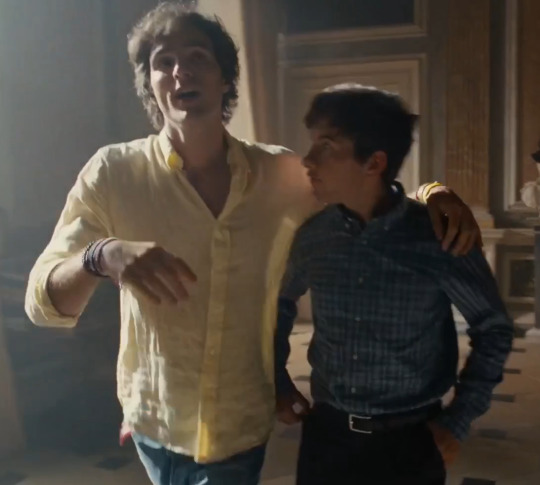
in contrast to Felix, in yellow. yellow is one of Felix's colors (he is the sun, which i've talked about here btw, so this makes sense).

same to Pamela, in blue. first time we see her, she is next to Elspeth, wearing the color that is Oliver's, taking the place that he takes right away, in this very scene. the only other time she is physically present on screen is at dinner, in black and white, and black and white are a blank slate. she is stripped of color and gone very fast.
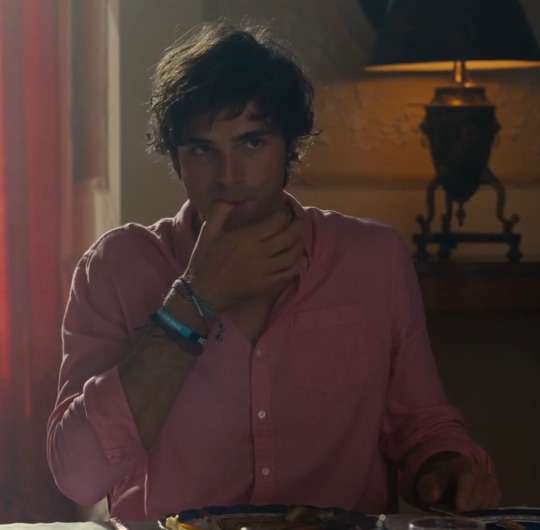
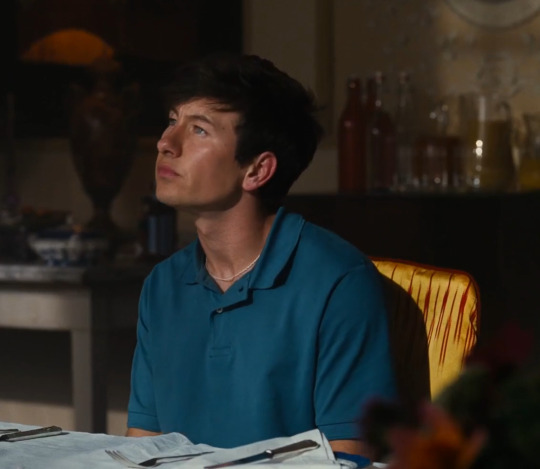
a bit of crucial data for later: Oliver, in blue, and Felix in pink. pink is very important on Felix. this is their first morning together. they are separate and opposite, solid, contained.
where it starts to get good is the morning after the vampire strike.
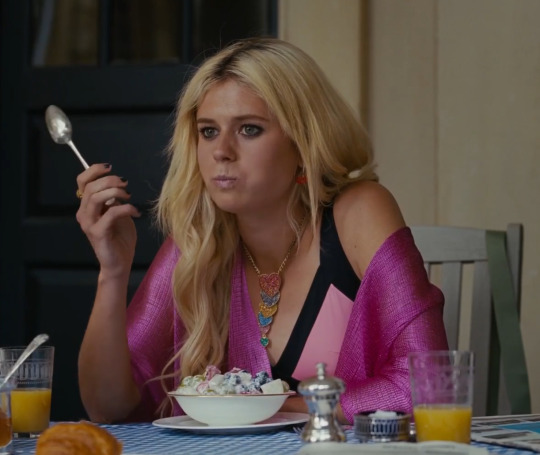


Venetia is a Felix extension, just as everyone in the house is to Oliver. i will eventually rant about Saltburn as a whole entity and Cattons as aspects of one self, and Oliver as psychosis, but not here. so, yes, Venetia is a pink riot, a euphoria of self-containment because Oliver gave her a piece of something she felt she lacked to feel whole (validation, attention, care), not a piece of blue, of himself. Oliver is expectedly solid blue. Felix is incredibly interesting and something i didn't pay much attention to at first: predominantly blue, incredibly upset at Oliver for ditching him, with a tile of bright red (on the left! close to heart! over-reaching here but like still!), which still tracks. i mean, really, if i had so much foreign color bleed into me and then abandoned, i'd be pissed, too. nice little touch is sir James' beloved hydrangeas, behind Felix, also pink, very pink, always pink; i don't think i've seen them blue in the movie, although the sort exists.

Farleigh. sweet baby Farleigh i love you. I'm not dead-set on my interpretation of this specifically but i think multiple things are happening with Oliver and Farleigh here. like Rent, which is their song, blue is their color of outsiders and the triers to fit in. Farleigh points out the favoritism and preference of Oliver to him and his mother here, so it may also be appropriation of color to draw attention to Farleigh as almost (but never quite) Oliver. it may also be as simple as that Farleigh, as much as he denies and resists, still retains Oliver's influence, which bleeds into him very slowly.
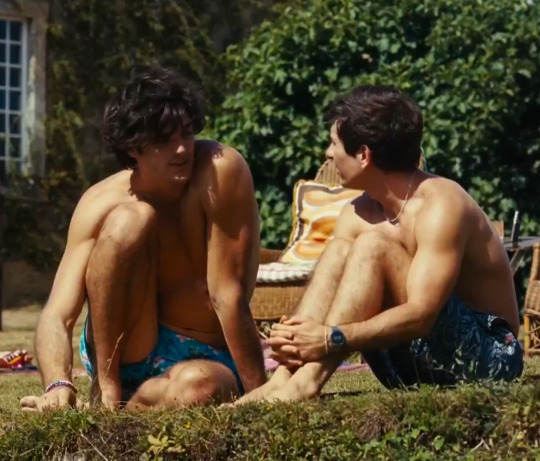
a nice little moment of Felix wearing blue swim shorts with just tiny specks of a pink pattern. Oliver's shorts also have a bit of pink, but less than Felix's. Oliver is pretty good at remaining unaffected and uninfluenced overall.
and we're getting to where it all clicked and started for me. the Quick family house, the failed reconciliation, and the immediate aftermath. oh it's so good.
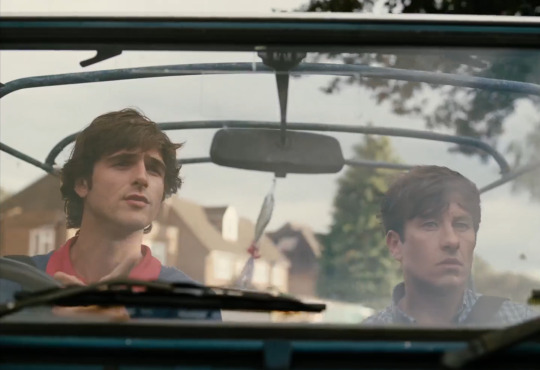
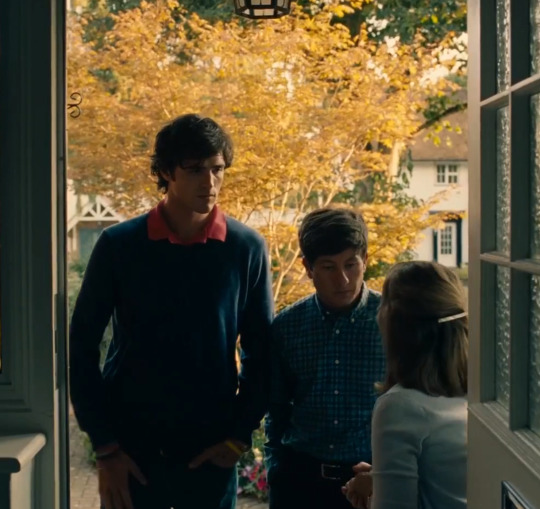

on the drive there, Oliver is blue, Felix has a pink polo shirt with a solid blue pullover over it. this is the most blue Felix has ever been (this is the most blue he will ever be!), this is trust. however shaky and toxic it is, Felix loves Oliver and accepts him into his world. as a side note, Oliver's parents are also very blue, mom more so than dad. nice!
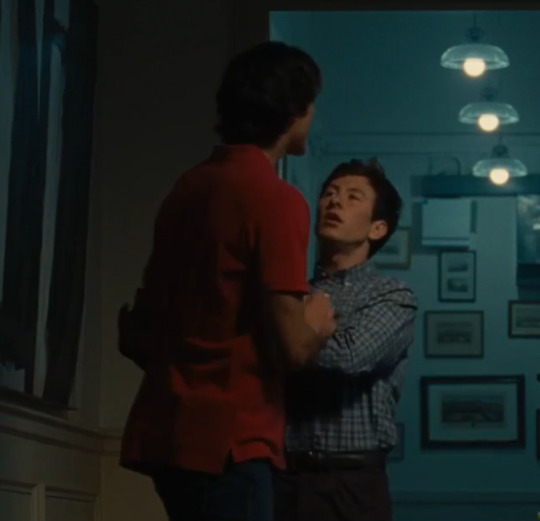
and then it crashes. immediately after, it's the evening of the same day, but Felix is not wearing the blue pullover anymore. this is very, very important. this is rejection. it's the end for Oliver in Felix's world and with his trust. Felix, again, in solid pink, Oliver in solid blue. Felix successfully rips him out with the roots and everything. ouch.
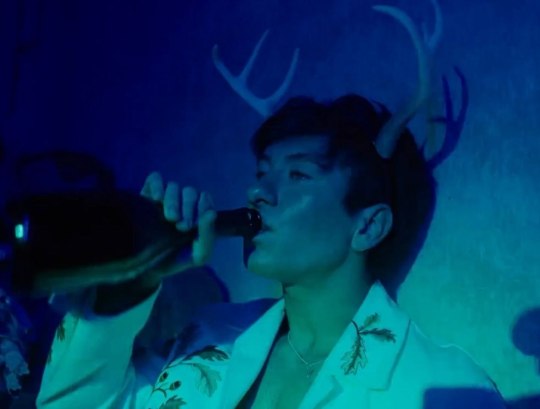
daddy. sorry. is that highlighter? sweat? fuck. let me- daddy. SORRY
no i actually have a point about this.

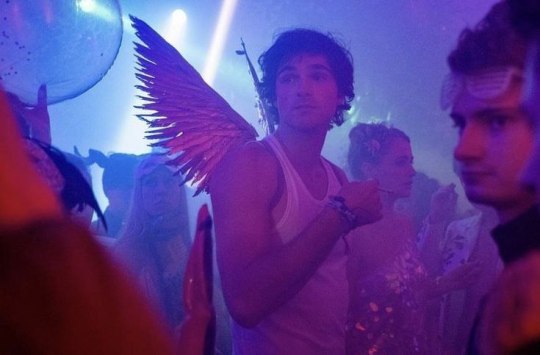
the clothes are replaced by the lights, but we roll with it. Oliver basks in the blue-green light, while Felix is on the other side, in pink and purple and red. sure, blue shines through, and Oliver also walks through the slashes of pink, but it is mostly pretty separate, Oliver watching Felix's pink in his own blue from a distance.
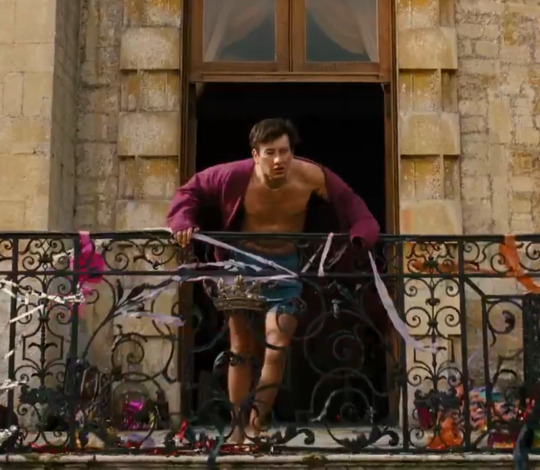
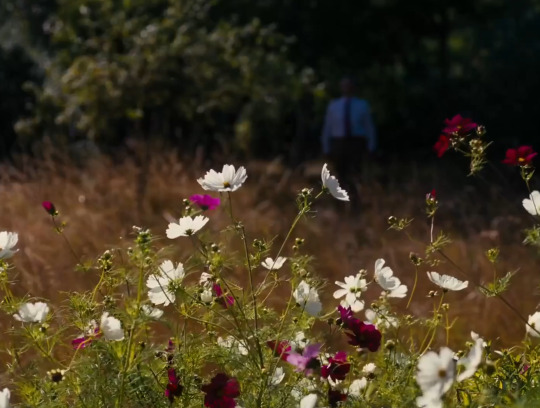
the morning after palette is deep. the wine color that is so prominent in these scenes is fascinating to me. if i were to over-reach again i'd say it's the Oliver in Felix's attributes and in his place that requires the robe to be so dark, not usual definite pink, because deep blue has leaked into the color itself, mixed with it, made itself integral to the shade. but it's also just a nice color, and it is pink in its core. the flowers (with sir James in the background) i think are also this specific shade for the same reason. you look at what remains of Felix everywhere here, and it is his color.
and finally oh the lunch scene. the last supper. the judgement day. the who's afraid of virginia woolf madness.
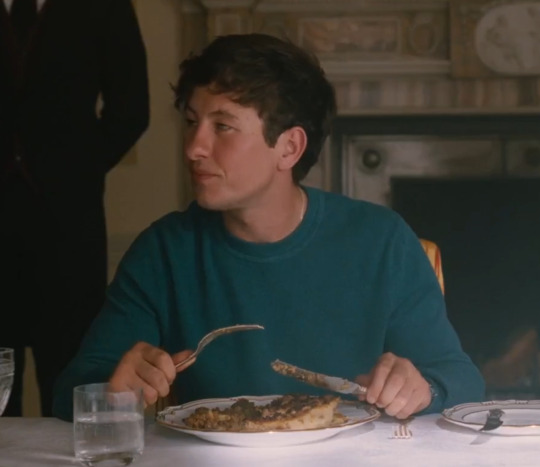
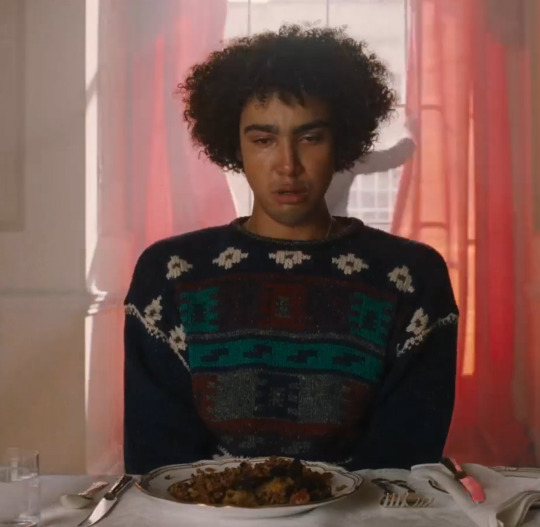
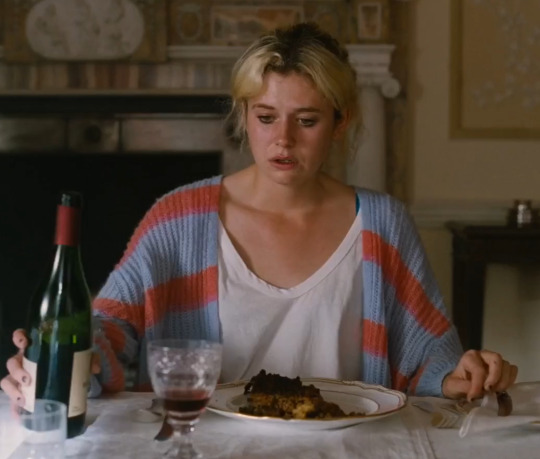
i think we've established what's up with Oliver, but i also think it's important that he is his own color at lunch but in Felix's pink/wine right before and after. lunch is where he attacks, whereas before and after is where he grieves and enjoys. Farleigh is almost completely blue save for a strip of the same deep pink, and he is soon cast out, and Venetia is striped, blue and pink/salmon, affected deeply by Oliver yet still clinging on to the Catton pink with grief, probably, but also love for Felix.
and after all this, Oliver leaves himself.
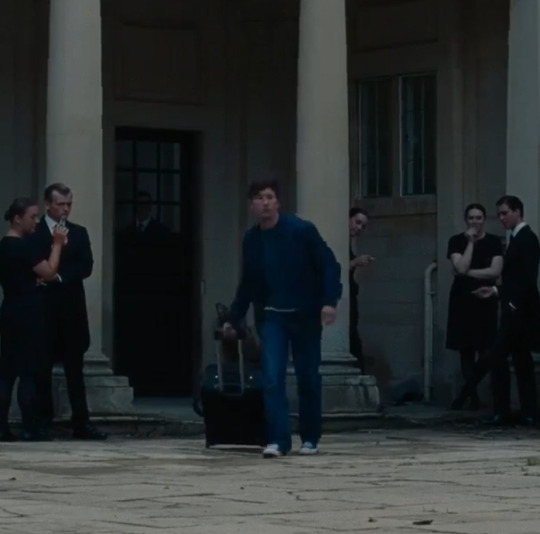
no, like, actually, literally himself. sure, he'd got a taste of the Cattons and the pink, but he is a monolith, a solid blue when he leaves Saltburn. he has not been affected by the house, he has taken what he wanted but stayed true and whole. what a power move, honestly.
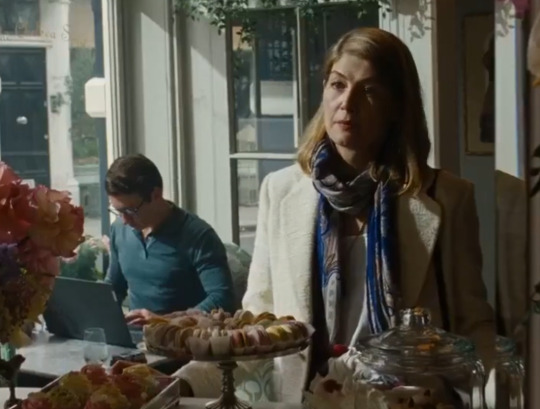
but it's an even bigger deal that 16 years later, Elspeth runs into Oliver wearing all white and a blue scarf. oh, she's not let this go, alright; it was a long time ago, "but not to me," she says. What Oliver has been up to in that time is a great question, without a doubt he's been keeping tabs on the remaining family as much as he could; but Elspeth has never moved on, either. She has held on to Oliver's blue and the pink is not important at all now. Oliver, of course, is invariably, unwaveringly blue. welcome back to his show.
and welcome back to his triumph.
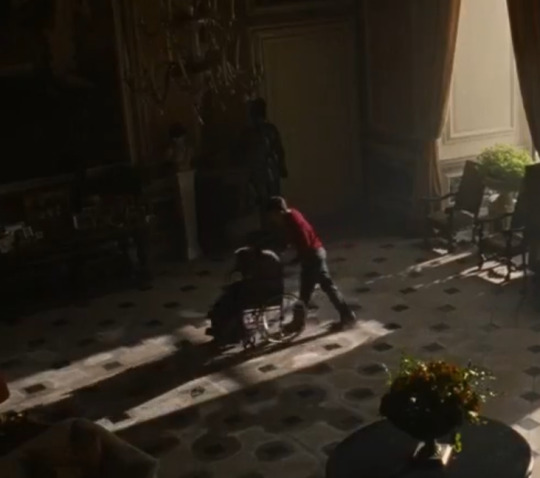
the only color (except for, again, white and black) we see him wear in the flashback about Saltburn inheritance is the all-too familiar deep pink. wine. bright pink mixed with deep blue.
now i will take a liberty and step back, over-reach, over-interpret and go insane. here's a fun bit on ancient greek culture trivia for you.

this is an interesting and complicated historiographical and linguistic debate that i will not even attempt to relay here, but the essence of it is this: for us, the sea is conventionally deep blue. historically, one of the most prominent civilizations considered "deep wine" to be the descriptor for it (not necessarily the color but the property. highly rec to look this up it's so fascinating). what it gives me here is that Oliver has changed color, but not his self. he has integrated, mixed, but persisted, completely winning over, triumphing. long live the king!
in conclusion, i would just like to propose "colors" by halsey as the next cattonquick anthem. thank you for your attention, please let me know your thoughts. yours, yes, you. cheers. god. peace out
#saltburn#cattonquick#quickstart#oliver quick#farleigh start#felix catton#venetia catton#mine#saltburn journaling
1K notes
·
View notes
Text
The major discourse I see about Saltburn is whether it’s about class or queer obsession. Surprise! It’s both! Spoilers below.
So at the start it’s definitely about queer obsession. Ollie is enthralled by Felix and as we learn at the end is happy to play the hapless little damaged boy to get his attention. We see a lot of affection and intimacy between the two. And at this point Ollie has never seen Saltburn. He knows Felix is rich and has a castle but that’s it. @magicspeedwagon7 has a great post about how we get a tour of Saltburn but not really. The whole scene is focused on Felix. He points to things out of frame and we don’t see them because we are watching him through Ollie’s eyes. We see him impressed by the house but once Felix is in the room he is all that matters. Here is where we see the major theme being his obsession with Felix.
And we see this building obsession with Felix. Leading to the bathtub scene. I think here and the grave scene is where we see Oliver at his truest. His most uncontrolled. He just can’t stop himself. He is alone and can act on pure emotion and simply do whatever he desires. He doesn’t just love Felix. He wants to ABSORB him. He wants to become one with him. Of course these are interspersed with scenes of him manipulating the family. This is when we see him desire both the house AND Felix. And the way to get the house is through Felix. We see the mingling of both themes, his obsession with Felix and his obsession with having more in terms of wealth and status.
He is being taunted constantly that Felix will throw him away because he simply enjoys broken toys until a new, more broken object comes along. He tried to disregard it. And then Pamela dies. And he watches how easily the family disregards her. She had lived with them for months and they threw her out.
Before I continue this whole thing hinges on the mirror scene. We watch him meticulously wrap his hand and then punch the mirror. Most people would just punch the mirror in a rage by Oliver takes the necessary precautions but in all that time still can’t calm himself. He still has to react with emotion.
And then his lies are revealed. And he tries to talk to Felix and he’s not having it. We see him cry alone, not for an audience, twice and one is when Felix first rejects him. He blows him off so he follows him to the maze. At this point he’s already dosed the bottle. So even though Felix is showing some tenderness. Even though he nearly kisses him. He shows concern. Ollie can’t see it. He has acted meticulously, dosing the bottle, taking a drink, throwing up, but he is acting on pure rage and fear. He’s been rejected by Felix and that’s driving him insane. And he’s scared that this is it, he’s being thrown away so Felix can go find his next fix. He can’t stop himself at this point. He can’t see the tenderness through his own emotion.
And so Felix dies. And Oliver doesn’t know what to do. The object of his desire is gone because of him. He killed him after being rejected. And he can’t handle that. He can’t accept that he reacted based on emotion. No! He’s a mastermind! The puppet master pulling the strings! But the only other time we see him cry while alone is over Felix’s death. All the times he cries in privacy are over Felix. He desired Felix and Saltburn and now there is only Saltburn. We have gone through him being obsessed with Felix, to being obsessed with Felix and Saltburn, and finally obsessed with Saltburn and convincing himself it’s always only been Saltburn.
It’s important to also understand the Cattons aren’t just rich. They’re British nobles. Oliver could only become one of them through marriage. And there’s a tendency of the middle class to appropriate the lives of those poorer while constantly desiring to the top of the food chain. Keeping up with the Joneses. They want to be the top 1% but while in America it’s possible to get there from the middle class (not easy, usually you still have to be born into that but you can do it) in Britain that’s the nobles. You can have more money than God you’ll still never be able to be them without marriage or birth.
It’s also worth noting that while killing the Catton women Ollie has no problem getting his hands dirty. He slices Venetia’s wrists, and he pulls out Elspeth breathing tube. But the men? James he simply waits to pass, I think he knew he’d never truly get an opportunity to kill him and not get caught. And Felix he poisons. He kills him in a way that not only requires no physical violence but one he also doesn’t have to witness. And he doesn’t kill Farleigh. He gets him kicked out. I think he knew Farleigh was the one who could truly see him. Not entirely, not the darkness, but he knew something else was going on there. So he was the biggest threat. So instead of neutralizing him himself, he convinces the family to do it.
Well Ollie has lost the man he loved/was obsessed with. Who could’ve been his ticket into this life. And he can’t stand he lost him to such a disgusting display of emotion. So he convinces himself it’s part of his plan. See he wanted the house. Never Felix, just Saltburn. Like so many middle class men he just wanted more. Greater. To be a part of that elite social class he never could. So he keeps going. Devising a plan to get everyone else out of his way. He’s willing to play the long game now. And if taking Saltburn allows him to also retain pieces of Felix, well that’s fine by him.
And he gets what he wants. But there’s the rub, he owns Saltburn. And all the money he could want. And he will still never be noble. He can never bridge that gap. The only way to become noble is birth or marriage. Because he lost what he truly wanted: Felix.
#idk this is probably dumb and ramble but I have thoughts#saltburn#saltburn analysis#oliver quick#felix catton#emerald fennell#elspeth catton#james catton#venetia catton#farleigh catton#farleigh start#there is also the themes of like the wealthy can be openly awful but everyone else must disguise it but that’s a whole other discussion
43 notes
·
View notes
Text
SPOILERS FOR SALTBURN
I haven’t seen Promising Young Woman but I did just see Saltburn and now I’m so dubious about Fennell’s politics that I’m basically obligated to see PYW to confirm my suspicions. It’s not that I think she’s conservative necessarily, but more that she’s so upper class London nepo baby rich that she could aspire to socialist feminism as much as she likes but it’ll never land because her background precludes her from ever having anything relevant to say about class.
There were things I liked about Saltburn. The editing, performances, black humour, costumes, sets, cinematography (NOT the aspect ratio - will explain) and the ballsiness of certain “transgressive” scenes I did appreciate. This is what makes it so frustrating and disappointing as a film. If you turn your brain off, it’s a wild ride, quite hypnotic and lovely to look at in that specific dreamy way that the dark, cool interiors of a house get on the hottest days of the summer. I hated the 4:3 aspect ratio though, it was POINTLESS. Why was it used? Surely it would have made more sense to capture the grand expansiveness of the titular estate in widescreen? It just felt twee for twee’s sake, like it was shot to produce compositions ready-cropped for big gifs on tumblr.
The “shocking” “transgressive” “erotic” stuff is not particularly any of those things. I mean, for me anyway. It might titillate the type of new-puritan gen z-ers who self censor it to “seggs”, but there was only one sequence that felt really “wow, I haven’t seen that in movie before!” levels of Going There. And even then these scenes always felt self-consciously affected, like Fennell only included them because she wanted to write a movie with fReAkY stuff, as opposed to the freaky stuff coming organically from the characters. I remember sitting in the cinema to see Call Me By Your Name feeling like I was burning to a crisp at the scene where Elio huffs a pair of a man’s used swim trunks - because it felt so authentic to this expression of a character who is at critical levels of desperate teenage horniness. In Saltburn, when Oliver gets down on his knees and slurps Felix’s jizzy bath water, it’s like… okay? Why? What does he want? We saw him lie about knowledge of the fancy plates to ingratiate himself to the dad, we already have reason to distrust anything he says, so it’s hard to believe he has any authentic desire for Felix. And that’s the main problem with the whole movie - the writing is fairly atrocious.
There’s no mystery. There’s no ANYTHING. There’s a tiny quick-cut flash montage of future events in the movie right at the start of the thing, so already we’re going in with no doubts that Oliver is gonna go nuts. So we know that bad shit is gonna happen, and yet the movie pulls out a big Twist Ending reveal like we… weren’t supposed to know that he’s been bad from the beginning? We don’t need all these flashbacks to show us he’d planned his dastardly deeds offscreen the whole time when we’ve already seen him commit OTHER dastardly deeds ONSCREEN. He’s given zero motivation. He tells us he did what he did because he hates this rich family, starting with Jacob Elordi’s Felix, but he had planned the whole thing from before they ever even met, or saw how the family treats the other two main victims of class in the film, Pamela and Farleigh. When Oliver starts spinning his web, Felix has never been anything but genuinely kind to him. Felix never did him any personal wrong except being born handsome, popular, and rich.
That’s the other glaring issue. Fennell has said this is supposed be another one of these “eat the rich” satires, but…. beyond the usual foot-in-mouth clueless social blunders, the movie portrays none of the rich family as even all that bad. Oliver isn’t even all that poor! His family are revealed to be extremely comfortably upper-middle class! This is not Parasite!!! The worst ethical thing they do is cut off Farleigh from family money - but it’s obvious to the audience that this is actually Oliver’s fault. So all we’re left with is this main character who’s the worst of the lot, with no reason to do what he’s doing except for being an asocial loser creep. If you’re making a class satire in Britain and your message at the end of the film is “those creepy disgusting middle class will pervert and mutate themselves to have what the beautiful victimised rich people do” you’ve… uhh. Failed. Somewhere along the line.
It wants to be The Talented Mr Ripley, but it is confused and stupid. Given Fennell’s background and social circle, is it any wonder? It’s like she’s looked around at her fellow Eton Oxford lot and thought “so the poors hate us because we’re a bit silly and old fashioned, right? no wonder they’re jealous, we’re all so sexy and our houses are so nice! Of course they’d do anything to have this!” She hasn’t seemed to conceive of the fact that the working class in Britain hate the upper class because millions live in genuine poverty while they get to obstruct social change because of archaic birthright. That many people in Britain don’t actually want to be the upper class, they want an end to them.
The thing is, I had fun watching it. I laughed a lot, and then left the cinema distinctly unimpressed, as one often does after interacting with people who go to private school and are perfectly charming but clearly still think they’re better/smarter than you because they have generational land, or multiple houses. I worked for 6 years as the stable groom for the heiress to a publishing fortune, I’ve met plenty of these people, believe me. All this to say, that this is deeply frustrating because I would like to turn my brain off from the dodgy politics and just appreciate a movie that goes out of its way to be visually stylish and includes a scene where a sobbing Barry Keoghan gets naked and fucks the fresh grave of his boy best friend. Now that’s entertainment
#I love freaky weird stuff in movies that’s my favourite stuff#but not when it thinks it’s cool and clever for being freaky and weird#that’s being a tryhard#your movie should be freaky and weird because you are freaky and weird
57 notes
·
View notes
Text
guys i’m having post saltburn thoughts
so i’ve seen lots of people comparing a lot of Venetia’s scenes to the painting of Ophelia which is fucking brilliant, but i’m also obsessed with the additional Hamlet imagery in it.
Hamlet is seen to be going gradually more unhinged throughout the play. why??? because he sees the truth and can’t believe others don’t see it. Ollie gets more and more unhinged as he realises the power he has over the Cattons, he sees his (unreliable) truth that he is entitled to Saltburn, and he can’t believe that they don’t see it (you all made it so easy).
The Ophelia painting is also mirrored when Ollie is in the bath after the bench scene, which then comes up AGAIN in the lunch after Felix has passed. Venetia (Ophelia) is visibly losing it after betrayal. she pours the wine everywhere including all over herself. She looks just how Ollie did in the bath except this time Ollie is clean and unfaltering - he isn’t affected by the mess he has created but it continues to affect Venetia more and more. there is so much more to this and my brain is exploding this film is brilliant
#saltburn#saltburn 2023#felix catton#venetia catton#oliver quick#barry keoghan#jacob elordi#hamlet#ophelia
32 notes
·
View notes
Text
Everyone Gets Lost in SALTBURN.
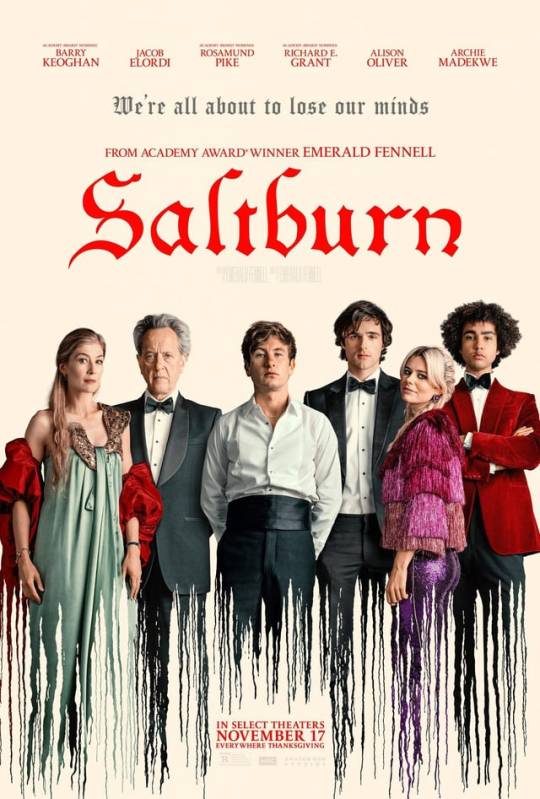
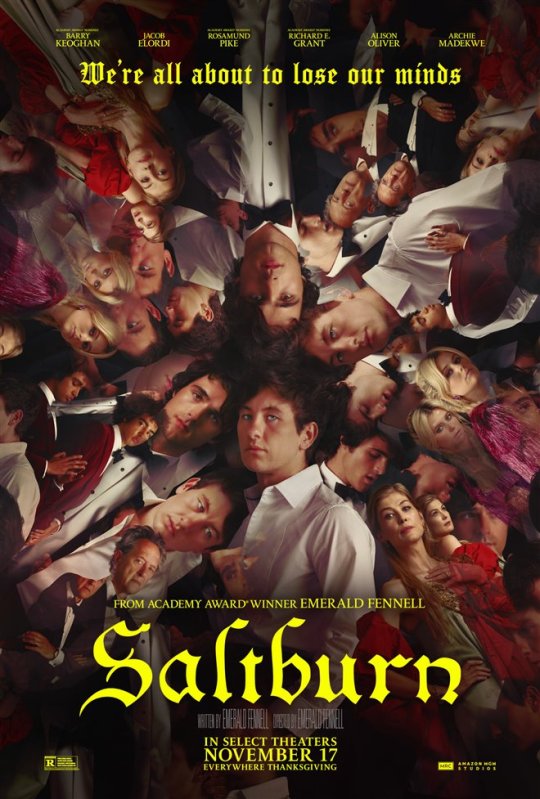
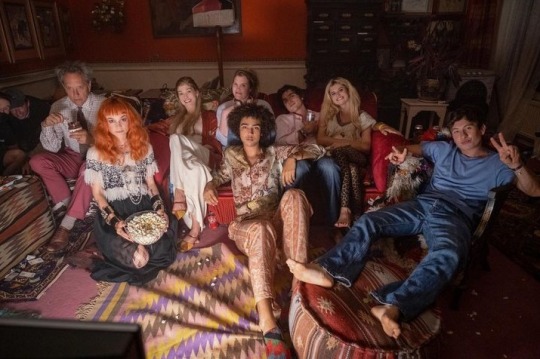
Including me, as I've gloried in this film three times -enduring the annoying Academy aspect ratio format (writer/director/filmmaking genius Emerald Fennell explained this ratio was used to accommadate the squareness of the estate and to enhance close-ups).
I love films that are bold and audacious; ones that are polarizing and divisive because that means it has touched the audience - for good or for bad - they have been given food for thought. Now, you may savour it, or vomit it out but you will wolf it down. I don't see how anyone could look at this film and be bored.
TL;DR

WARNING: MORE SPOILERS THAN ROOMS IN SALTBURN
THE GOOD
EVERYTHING. Barry Keoghan owns every single frame of this film. He gets to use so many colours in his acting palette and while I don't have faith in the Academy, I hope that they nominate him at least.
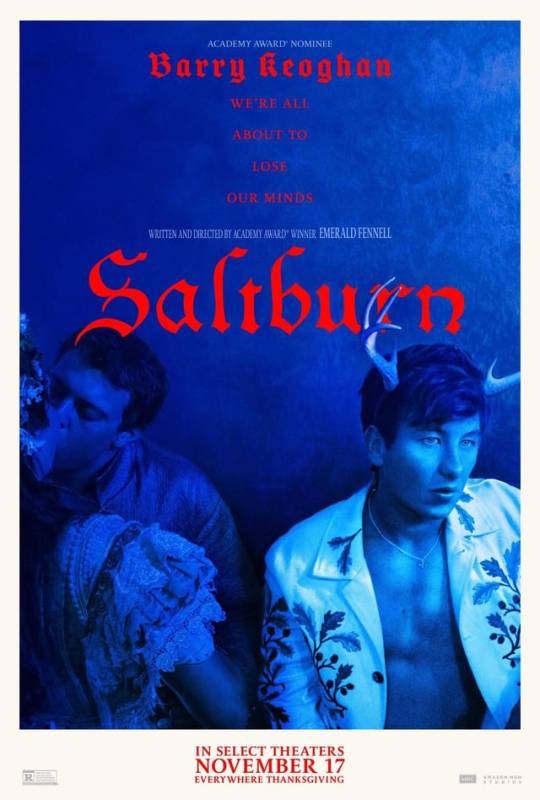
Same goes for Archie Madekwe as Farleigh. He is the Tom Wambsgans of SALTBURN (complimentary). He's a hanger-on who hates the other hanger-on. Fennell could have just written him as one note - just nasty and cruel bully, but he had more dimensions than that.

We get a glimpse at how he hates that his mother has to beg (by way of Farleigh) for financial support. He could have just been someone who held the attitude of, "I've got mine, now get yours", but it bothers him that his mother is struggling. He hates that he lives a pampered life while the footmen are ignored. I especially love how he has no shame over being taken care of by the Cattons. Kicked out of 3 schools for blowing teachers? Oh, well. Sir James' connections will get him somewhere.
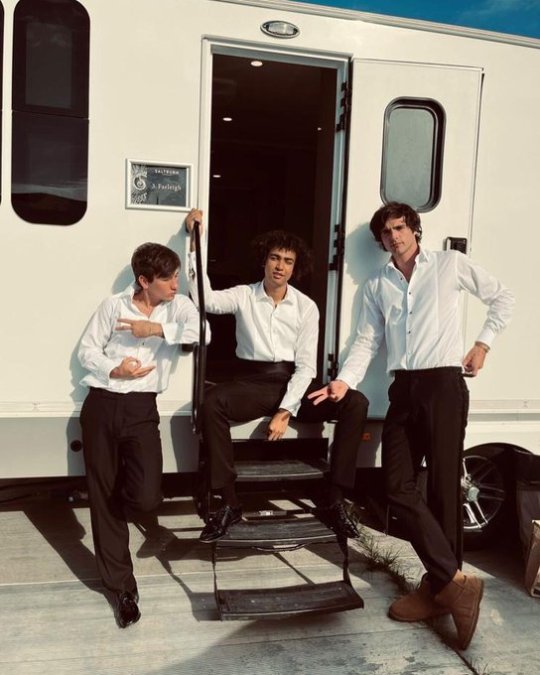
He sets up Oliver to karaoke to The Pet Shop Boys' "Rent" and when Oliver remarks, "Felix, I think this song is yours too." (a line that never failed to pull a reaction from me), Felix doesn't tuck his tail between his legs. He's not embarrased. No, he gladly takes the mic.
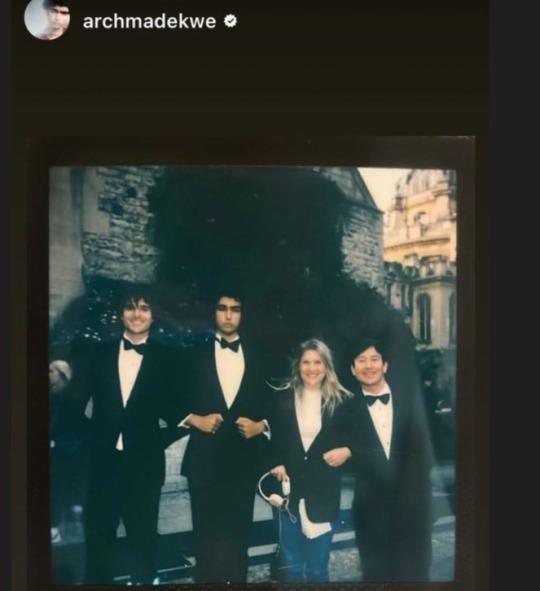
Then there is Rosamund Pike who is never not fantastic in everything. Elspeth is so droll, so cutting, yet so loveable.
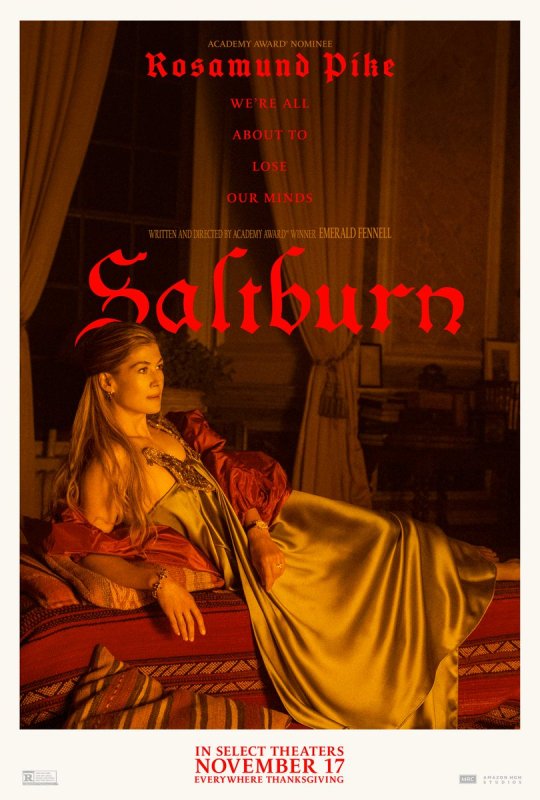
Pike tosses out these lines that carry such humour in it, effortlessy. Like Farleigh, Elspeth is someone you probably should dislike - not batting an eye when discussing Pamela's death, judgmental, gossipy - but she, like Sir James are charming. Their obliviousness comes across as a mere quirk in their personality versus a deal-breaker.
The humour. This movie is so funny. What I appreciated though is that where most directors would put laughs to diffuse the preceeding scene, Fennell plays it straight. You are sat there without any quip or hammy performance to distract from Oliver drinking Felix's cummy bathwater and lapping the drain for good measure.
Or from Oliver and Venetia's menstrual blood swapping. Or grief stricken Oliver humping Felix's grave. The laughter, however comes from the audience. I've seen it three times so I've experienced three different audience reactions and I was surprised by how much people laughed (and gasped. Or closed their eyes), when to me it was serious bizness.
The first screening I attended had a Q&A with the film's composer, Anthony Willis, and he said that when he does panels with Emerald she always apologies to the audience for the pervisity. Why apologize, Emerald?! Talk your talk!
The only scene I could think of where humour was added to diffuse a scene was when Oliver kills Elspeth and he's draped over her trying (and failing) to put her limp arms around him. I think that was necessary so audiences can go into the end scene of him dancing victoriously through his ill-gotten estate.
-When Felix starts clueing in that Oliver lied. The way the unasked question where they pull up to Oliver's home. You can see that he's taken aback by a supposed addict would live there. Then you can tell the realization is falling on him when he spots the lawn being watered because what hardcore adcict would care about maintaining the lawn? But it's the "Gone Fishin'" sign that made him realize he's been duped. Jacob played it so well because it was very understated. Even the entire scene with Oliver's parents (played by Dorothy Atkinson who displayed that same fierce love of her child in "Pennyworth" and Shaun Dooley who's usually playing a tough nut.).
THE BAD
The bad actually has nothing to do with the film itself. It's the perception of Felix that Jacob Elordi and Emerald Fennell holds. They both paint Felix in the most terrible light with Elordi saying Felix is scarier than his character in EUPHORIA and Fennell calling him callous, misogynistic and racist. While I can see where she paints him as such in the film (leaving Oliver to walk his bike back to campus, not talking to the girl/s he's going to have it off with, just hitting her on the butt and walking off with her, having the very tone-deaf attitude of "not seeing race" by telling Farleigh that he doesn't care that he's "different" from them. But does that make him a truly awful person? Maybe it makes me an apologist because I can see how Felix's life of privilege makes him oblivious on how to treat people.

Fennell says her direction to Elordi was that Felix is a bad kisser and bad at sex because he never has to try; he doesn't need to impress. That makes sense because if one is wealthy and/or conventionally beautifully those things does the heavy lifting and grants you a ton of leeway. Since it works for him, why would he even think he needs to pivot on his behaviour?
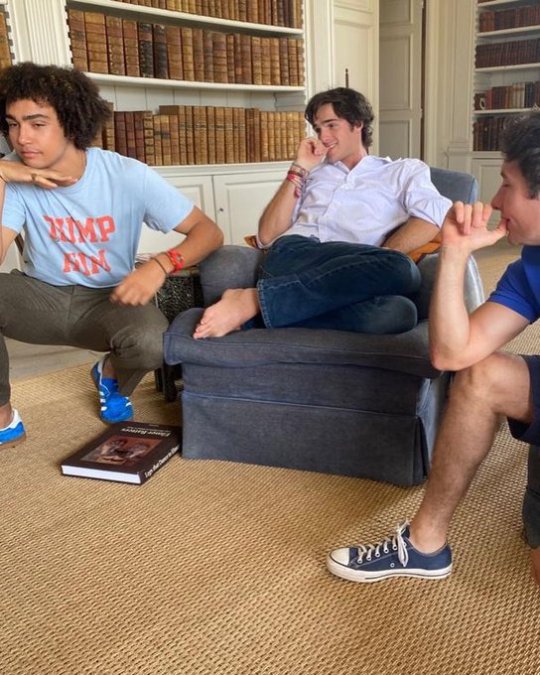
I just don't see Felix being a terrible person. He ran interference for Oliver at the bar, he tried to get someone to hook Oliver up with a friend, he ditched the graduation party to support Oliver after the "death" of his father. Duncan was so crushed by Felix's death that he couldn't even close the curtains. Liam or Joshua (the Footmen Farleigh said Felix didn't know the names of) ran off crying after closing the curtains while Felix's body passed by. You would think if he was such a horrid person the staff wouldn't be so affected by his death. He pushed Oliver to stay for dinner at his parents house because he could see how much it meant to them to just have homemade SpagBol and cake.
He may be oblivious and has blindspots, but I'm not buying that he's abominable.

THE REST
-When Venetia is telling the story about the doppleganger, there's a window to the garden behind her and you see a man in a pink shirt walking past, then we cut to the reactions at the table to her story and Felix is wearing a pink shirt. Could it be Felix's doppleganger? A harbinger of his death in the garden? If we take Felix seriously, Saltburn is inhabited by Felix's dead granny. What's one more supernatural occurrence?
-In the credits are images that alludes to what has transpired: we see a spider because Venetia tells Oliver Sir James calls him Spider-Man because she skulks and she says he spins his web, she thinks he's more of a moth (I say he's a kitsune. He's a shapeshifting, beguiling trickster.).

There's a puppet on a string - and that has a dual meaning of the shoebox theatre of Catton family puppets that Felix examines when he first arrives at Saltburn and latter stops in front of at the end when he fixes their memorial rocks atops it; and also how Felix was ultimately a puppet master. There's also an ouroboros and a pair of glasses, which I loved seeing because Oliver sheds his glasses when he gets into Felix's circle. We eventually realize that they were merely an affectation. A costume he adorned to get in order to get into the character as humble, unassuming scholarship kid and shedding him once he was ensconced in Felix's circle.
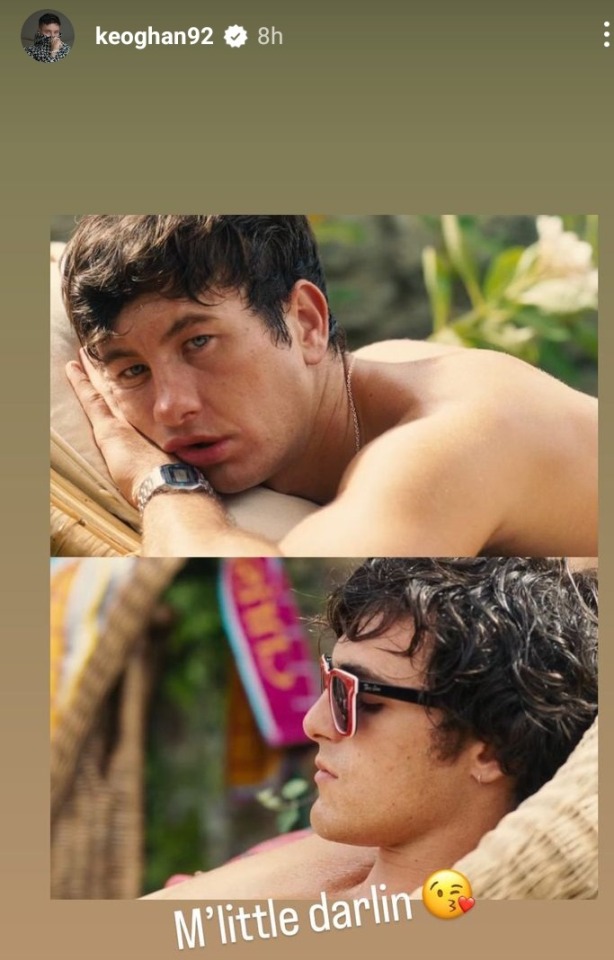
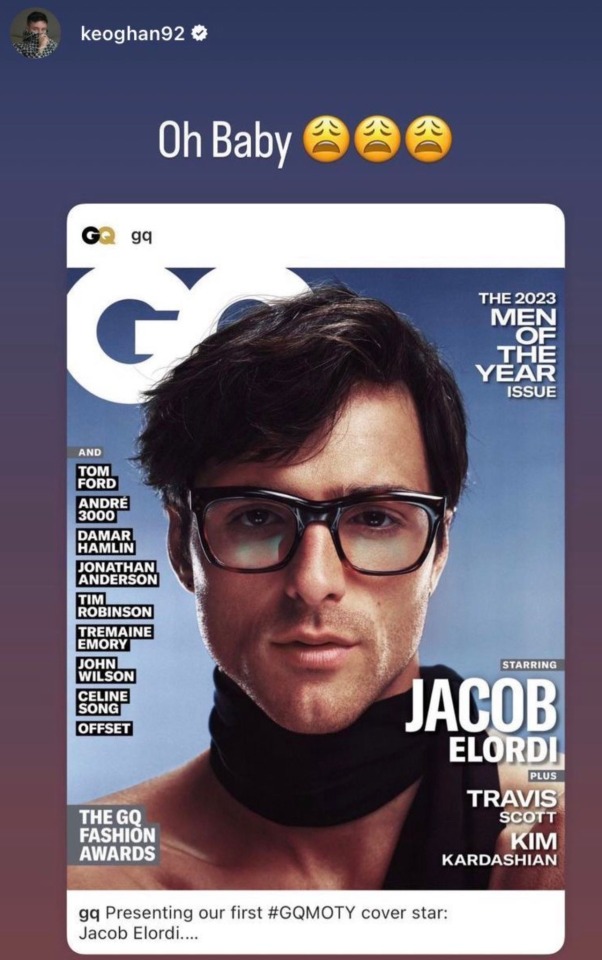
-I ponder whether Felix truly considered Oliver a friend. Ewan Mitchell's Michael (the other asocial scholarship kid) warned Oliver that Felix would get bored with him. Venetia tells Oliver that she likes him better than the last one. Her words seemed like this is Felix's folly and he does this all the time and Oliver was merely another stray. Then we hear from Felix that a friend he invited had a fling with Venetia and it ruined his friendship. Maybe Felix doesn't get tired of these guys, but they make a mere (perceived) misstep and he ends the friendship. We see it almost happen when Felix yelled at Oliver for making a fuss about the state of his dorm room. Which is why Oliver deployed Operation Dead Dad - he needed a gambit in order to not lose Felix's friendship.
There were a few times where Felix could have ditched Oliver, but he didn't. If he's as flighty as people perceive him to be then I think he would have just made an excuse for Oliver to not attend the fancy dress party. Cancellation wasn't the only option. He could have just pulled an Elspeth and had Sir James make Oliver leave in the dead of the night.
Instead, even after everything he now knows about Oliver's deception, Felix looks crushed after their talk in the maze. His anger from earlier seemingly turned to sadness. Maybe his apparent dejection stemmed from what Oliver said to him: how he was just giving Felix what he wanted; thus (screw you Farleigh, "thus" is a good word) probably making Felix ponder whether everyone around him are playing roles - court jesters trying to appease Felix their king and no relationship he has with anyone outside his family is authentic.
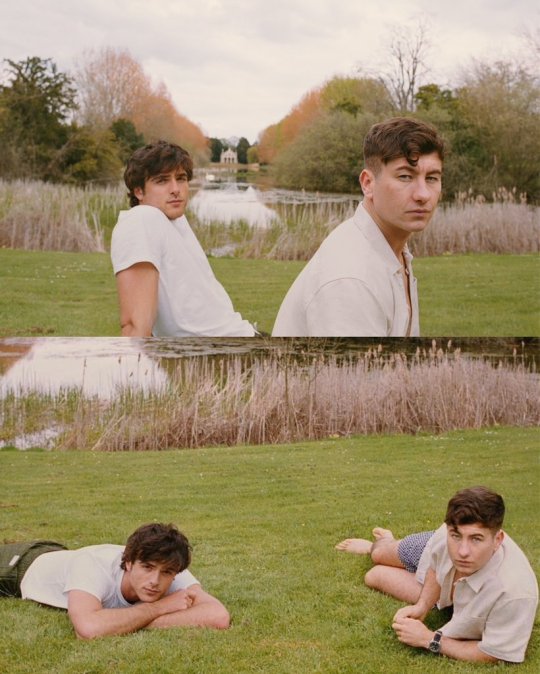
Or maybe Felix had sexual interest in Oliver (because I don't think anyone had a romantic interest in each other in this film; sexual/carnal/opportunistic, yes)? It's powerful when someone obviously wants you. Even if you didn't have any prior interest in that person the, "What if?" or "Why not?" aspect comes into play and you want test how far it could go. Venetia told Oliver, "Felix doesn't like to share his toys. Even the ones he doesn't want to play with anymore." Maybe he just liked male attention, but had no intention of following through. I don't know. Maybe Oliver wasn't the only unreliable narrator.
"I wasn't in love with him."

#saltburn#saltburn spoilers#barry keoghan#rosamund pike#jacob elordi#archie madekwe#emerald fennell#movies#films#long post#movie talk#tldr#felix catton#oliver quick#farleigh start#saltburn movie
40 notes
·
View notes
Text
Saltburn and The Talented Mr Ripley
I keep reading that Saltburn is a dollarstore version of The Talented Mr Ripley and I disagree... strongly.
1)This movie is a mix of genres and in open dialogue with many movies and books. People act as if this makes it unoriginal, but creators doing this consciously (and Fennell is very open about her influences) is not something new and WAS in fact used in movies and literature to make works exist not just individually, but also within genres and traditions, in comparison to one another. I don't think it's a matter of being uninspired and it's lovely that a movie that is meant to be pure, delicious fun has this much work put behind it.
2)Fennell herself has said that she loves Highsmith even though, when writing Saltburn, Ripley was not in her mind consciously like gothics and british country house stories.
I DO think that, subconsciously or not, she WAS affected by Ripley, but I still find that the similarities are contextualized within the genres and themes that interest HER. Some comparisons:
-Oliver is not in it for money in the beginning. He's not a poor, ill-treated-by-family opportunist who's working in whatever manner he can to get by or who HAS to be deeply closeted because his society and several specific characters have shamed him for his sexuality.
-The scene of Oliver cleaning Farleigh's room is compared to Tom cleaning up after Dickie and the latter snapping. A main difference I see is that in the Ripley-movie (this scene was not in the book), this is a very minor moment and Dickie is living up to his name short of two letters because he's irritable, grieving and guilty. In Saltburn, this scene is very different in context. Oliver is not cleaning casually. Felix complains about the heat and he's still like a piglet in his own filth, too rich to raise his finger. I DO remember my time at campus during the summer and the temperature in there, and the idea of two-days-old remnants of food being thrown in a room and having started to smell? Oh, boy. While what Oliver said can be seen as insulting, it can also be seen as honest and Felix's reaction as kinda immature and wanting to both be what he is and never be judged in the slightest, even if it's not in an ill-intended manner. This shows us part of who Felix is, why people put on performances for him, and how Oliver observes, acting on a trial and error basis, and shifts his performance as he goes along to fit to what is wanted of him. This is a scene that does a lot of groundwork in a small timespan.
-Unlike both book and movie-Dickie, this never becomes a story about Felix leading Oliver on. Whether Felix is aware of Oliver's feelings for him is never at the forefront. In fact, it's quite likely that they haven't registered, just like many things don't for him, and that's part of the story the movie is telling and of the criticism it's making.
-I'd also like to compare the three murders. I'm saying three because book!Ripley and movie!Ripley have different murder-scenes. In the movie, Dickie's annoyance and resentment escalate in the boat. Tom is finally honest in a way he never has been for, accusing Dickie of putting on a show himself, of leading him on, of being the one dishonest about his feelings etc. After all, by that point Tom has used honesty as manipulation in the beginning and has been genuinely honest later. The murder happens in the heat of the moment. In the book the murder is 200% premeditated. Tom had settled upon murdering Dickie and taking his identity before they are even on that boat. In fact, being on that boat is part of Tom's plan, and some final moments of having Dicke back in a good mood and experiencing his 'light' again, to not stay his hand.
In Oliver's case there is a very different quality to the murder. Felix has not reached some point of being bored. He has learned of Oliver's excessive lies and can't look at him as the same person no matter what Oliver says. Oliver deep down gets the gravity of that, yet he feels indignant because he knows that all people around Felix play little parts and doesn't see himself as being any different. In this case, the murder is premeditated, but undesired. Oliver wings the murder after his and Farleigh's discussion, being afraid that all of this will become a dream he is reminiscent over while he lives a miserable life, having become like his parents. The manner of it is inspired by the scene he witnesses when he tries to approach Felix in the bathroom during the party and when he sees Farleigh too doing lines. But even then, the confrontation in the Labyrinth is very real and heated. Even with the premeditation, Oliver is deeply desirous of having Felix's light sign upon him again and ready to put and end to his plan if that happened. It's never about taking everything away from Felix. It's about: 'If I can't have you, if you won't have me, you can't exist.' It's about Oliver's last hope being crushed. The rest is only the result of growing resentment and hatred, combined with an inability to let go and a need to feel victorious; a conqueror.
My point is that I don't reject the comparisons, but I think that there is thought, effort and depth behind the writing of this movie and it's not some downgrade.
16 notes
·
View notes
Note
*kisses your brain* I am BEYOND interested in seeing the interview clips that inspired/back up your thoughts and analysis
aw yay!!! im so glad this is interesting to more than just me LOL
if any particular essays/ideas pique ur interest, i can give u a deeper dive into any of them with more clips & links, but for now under the cut i'll do a couple of short recs for each:
A Wolf in Deer's Clothing
oliver's deceit (and portrayal as a prey animal) was much more obvious in the movie, but getting to the crux of felix's role as a false-angel was heavily inspired by:
this interview where jacob dives into felix's need to be needed and seen as a savior, and
this scene breakdown with emerald, where she points out felix's desire for power masquerading as kindness
A Midsummer Night's Mare
this essay in particular is in response to the general fandom impression that oliver being drawn toward farleigh is anything but a horrific extension of his existing obsession toward felix and this was most heavily influenced by my own eyes and my ability to identify sexual assault when i see it (LOL) as well as:
this collider interview with archie madekwe where he talks about the development of farleigh's relationship with oliver, and even more importantly to my point, the catharsis farleigh gets from coming back and saying his piece at the midsummer night's party
The Eye of the Beholder
i've got a million interviews i could give you where emerald talks about the voyeurism in saltburn, but i think these details come out most when she's doing scene breakdowns and particularly in:
this moment of a vanity fair interview where she picks apart the details of the house that saltburn was filmed in, and the nature of the people that live inside of it and this bit from the same interview where she talks about the exhibitionist nature of the bathroom setup
this esquire interview where emerald lets us in on the workings of the house and how nothing can be private
sidenote: these two scene breakdown interviews are two of my favorites that i've seen come out of this movie, so i definitely recommend them in their entirety if you're at all interested!
Gender-Fluid
this might be my favorite topic on this list and the one that i think is most important and i'm SO GLAD that emerald has had some really great interviews where she gets to talk about these things. my favorite being:
this reign interview with josh smith that i really can't recommend enough, where emerald brings up the way women's bodies are used and objectified in film and addresses and challenges the "shock" that people claim to feel after seeing saltburn
THOSE!!! are my starter recommendations!!! but like i said at the beginning of this post, if you have anything in particular that you really want to dive deeper into, just lmk!! <333
#saltburn posting#saltburn 101#< new tag for essay stuff#this was rly fun lol thank u for letting me go crazy on ur ask#like i said w the og post too#its rly good to just get my thoughts down and start making lists and bullet points#and getting something slightly more physical than all of the disorganized thoughts bumping around in my brain#also while compiling this list i spent. probably an hour watching interviews i'd already seen#and another 30 minutes watching new interviews i didn't even know existed#so thank you for that lol#asks
23 notes
·
View notes
Text
Saltburn: Bonkers, Balls-to-the-Wall Brilliance
It would be no exaggeration to say that Saltburn is the craziest film of the year. I've never seen anything quite like it; it's distinctive in the best possible way, even while being rich with references to other iconic works. Emerald Fennell's sophomore feature is an exploration of class differences and a comedy of wickedly bad manners. It also morphs into a surprising, devilish thriller. It's the kind of film where you can’t look away, even when (perhaps especially when) you can’t believe what you’re seeing onscreen.
Saltburn begins with Oliver Quick newly arrived at Oxford. He's a fish out of water on campus as a scholarship student. He comes from the wrong background, he doesn't wear the right clothes, and he doesn't possess the right affect to fit in with the posh students that surround him. When he does a kind turn for Felix Catton, the popular student he's admired from afar, things start looking up and he's ushered into a world of partying and camaraderie. That summer, Felix invites Oliver back to his family estate, Saltburn, and things escalate amid decadence, debauchery, and class tensions.
Saltburn is a lush cinematic experience, composed of fresh, original, shocking images. So many shots feel like discrete works of art, the kind that wouldn't seem out of place in a gilt frame on some illustrious wall, reminiscent of the artistry of Kubrick's Barry Lyndon. At the same time, they all meld together to comprise a masterpiece. The startlingly potent sensuality practically drips from the screen, catching one up in a fever dream of desire and deviancy.
Barry Keoghan plays Oliver, and really proves himself as a leading man. I’ve been following Keoghan’s career with intense interest since his one-two punch of Dunkirk and The Killing of a Sacred Deer in 2017. And boy, is he realizing his potential. He blew me away with his heartrending performance in last year’s The Banshees of Inisherin. He excels at the humorous and the harrowing, sometimes in the same scene. He’s the kind of actor who can genuinely make you laugh and break your heart. He goes all in. You feel his pain, and I know I find myself rooting for his characters even when I probably shouldn’t.
My favorite kind of performance is an unhinged performance, and Keoghan delivers an all-timer in that category. His Oliver is comparable to Mia Goth’s turn in last year’s Pearl, for sheer emotional and eccentric abandon. The extreme emotion and behavior Keoghan exhibits as Oliver is thrilling to watch. Saltburn is such a great star vehicle star for this highly unique, unusual performer who has really been given his time to shine. He commands attention and the camera captures him perfectly here: his intensity and subtlety and those arresting blue eyes. Keoghan is a truly fearless performer. If there's any justice, he'll be nominated for an Oscar for this incredible performance.
This is a great ensemble cast, which includes Jacob Elordi as Felix and Alison Oliver as Venetia, Felix's sister. Carey Mulligan provides a disarmingly sweet and funny turn in a small role. Paul Rhys is chilling as Saltburn's imperious butler. Archie Madekwe is deliciously vicious as Felix's snobby cousin, Farleigh. Richard E. Grant is on point and hilarious as the Catton patriarch. Besides Keoghan, I felt Rosamund Pike was the standout and that this was her best role to date. The part of Elspeth Catton, lady of the manor, seemed tailor-made for her. Saltburn definitely deserves to be nominated for a SAG for Outstanding Performance by a Cast in a Motion Picture. The actors all play off each other beautifully.
I’m in awe of writer/director Emerald Fennell’s artistry and uncompromising vision. I love how she lets scenes go on uncomfortably long sometimes (like in the infamous climax of Promising Young Woman) to get her point across. She’s not hemmed in by conventions of how long a disquieting scene “should” go on. She doesn’t compromise for anyone or adhere to conventional tastes.
Saltburn is told through a great framing device of Oliver recounting the events of his pivotal year at Oxford and Saltburn to an unknown listener. It keeps you guessing as to who he's relaying this tale to. There are echoes of Wuthering Heights, Brideshead Revisited, The Go-Between, and Call Me by Your Name. In other words, timeless stories that will always resonate in the culture for good reason: they’re primal and get to the heart of the human experience. Yet Fennell's narrative veers in wholly unexpected directions. To watch her pull off the trick of this narrative is a privilege indeed.
Saltburn is a sterling example of bold, unapologetic filmmaking. Emerald Fennell is a cinematic visionary and a canny provocateur. And in case all this rhapsodizing wasn't enough, just know that this movie is HOT. It's fierce and feral and it demands to be seen. Viewers are in for a sick and sexy thrill ride. It's disturbing, deliciously demented, devious, nasty, and wonderfully messed up. Please go see it in theaters: let’s help wild, invigorating, conversation-starting cinema continue to get made and theatrically released.
#saltburn#barry keoghan#movie review#emerald fennell#jacob elordi#rosamund pike#alison oliver#archie madekwe#richard e. grant#recommendation#film#movie#oscars#oscar buzz#review#writing#my writing#recommended
23 notes
·
View notes
Text
Murder on the Dancefloor: The Chokehold of Oliver Quick
'Saltburn' has catapulted leading actor Barry Keoghan into our daydreams, revitalised music careers stagnant since 2007, and ensured we never look at a bathtub the same way ever again. It's delicious darkness has amassed a huge audience, some revelling in its lurid glory and others questioning what the f*** they just watched. There’s so much to say about this film, so many parallels and Easter eggs that tickle the brain notice - for today, I’m focusing on why Oliver Quick intrigued me the most.
As a devoted horror fan, some of the more controversial scenes served to stimulate rather than disturb… The vampire scene? That's just an average Tuesday night for some. The grave scene? Nothing compared to the visual impact Patrick Bateman’s hobbies. But what did succeed to unnerve me was the turning point of the film, when Felix suprised Oliver with a trip home for his birthday. You watch with stunned panic as she says his dad has been pacing all day waiting for him - in real time the web was unravelled and Oliver's traumatic background was quickly proven to be a façade. For me this scene positioned the 'real' Oliver to the audience, realising the person we thought we knew isn’t real at the same time his friend does. And this is where my interest peaked. For me, this film suddenly turned from a critique of the upper class, to a mythological study of a sociopath, and the subsequent events demonstrate how someone with an apathetic disposition could easily infiltrate and dominate a household of such wealth and status.
On a second watch, I couldn't help but laugh at Felix's naiveity as he pulled into the driveway of this enormous house, and noted that it looked as though his mother 'had really turned things around'. Anyone watching this would immediately question how someone allegedly suffering with severe mental illness and drug abuse issues manages to, in the space of less than 6 months, become the owner of a property of that scale. This small observation highlights just how out of touch Felix is anyone outside of his social class, and how Felix's pity towards Oliver, be it through kindness or ego or a convenient blend of the two, blinded him to the manipulation.
Another incredibly successful aspect of the film is the iconic soundtrack. It has brought some early 2000 musical classics back into the spotlight (we all know the best one) and I can admit I have listened to 'Loneliness' more times in the past two weeks than ever in my 26 years of life. The soubdtrack embodies the nostalgic and romanticised qualities of the film, set in 2006 before smartphones dictated every aspect of daily life, especially as a fresher. I may have been only 10 when Oliver Quick started university, it still made me long for the simplicity of this era of my life, when getting to know another person was fundamentally down to face to face interaction.
The choice to turn back time to the mid 2000s contributes to maintaining the mystery of Oliver's identity, depriving the characters of the ability stalk his social media profiles and forcing them to take his personality at face value. His manipulation, and eventual dismantling of the Catton family, was arguably possible through his ability to present himself without the hinderance of a digital footprint. There was no evidence available to anyone in Oliver's immediate circle of the sisters we found out he had, of the father that had infact not died, nor been an alcoholic drug dealer. So why did he lie?
In analysis I've seen online, many people contribute his deception to a need to be noticed by Felix, or in Oliver's own words, to 'perform' for his attention and friendship.
Revisiting the film, I picked up on certain phrases Oliver used to describe his home life, describing it as 'dirty' and proclaiming he could 'never go back'. To us, this sounds like the way you would describe his chaotic home life he described. But when the reveal comes, you can’t help but question why he’s adamant to distance himself from a seemingly stable, and privileged background.
During the scene, his parents also mention how he is the top scholar at Oxford, a member of the rowing team, participating in the school play... his chronic deception extends beyond the Catton family to his own. They also share with Felix that he was 'such a loner' and was 'so clever' that he struggled to make friends, both earmark characteristics of someone with sociopathic tendencies. This illustrates an individual who has never been satisfied, who always saw himself as superior, and who's fixation with Felix was just a desire to climb up and out of all the menial and average and into a position of absolute control.
The grandiose and self-absorbed lifestyle of the Saltburn estate allowed for someone like Oliver, whatever his original or developed intentions, to blend in without being truly seen until, both before and after death came knocking. The need to stifle emotional expression (We don't want to hear your American feelings, Farleigh!) and the uncomfortable obligation to uphold the British sentiment to 'Keep Calm and Carry On' gave him an invisibility cloak, blending in with his surroundings. It reframed Oliver's awkward disposition as one of politeness, and his manipulative sexual deviancy was guarded by members of the household behind a wall of upper class social etiquette.
I can safely say I have fallen into the deliciously depraved world of Saltburn, so much so I’ve felt like I had to write this. I love experiencing and analysing media, but this one really had me captivated. This is a maze will happily lose myself for weeks to come, especially when it comes to the complex and captivating portrayal of Oliver Quick - I would definetly sign my estate over to that beautiful crazy bastard.
#artbychelcie#saltburn#oliverquick#barry keoghan#emeraldfennel#saltburnmovie#goldenglobes#sociopath#filmanalysis
13 notes
·
View notes
Text
2023 MOVIE RECOMMENDATIONS
Here are six films from last year that may have been overlooked with louder movies demanding all the attention. Not saying they’re unknown—some of these are even awards season contenders—but they wouldn't likely be prioritized over, say, Barbie or Saltburn.

Many of these are in my top 10 from 2023, but until I see Poor Things, that list will never be finalized.

MONSTER – a masterful exploration of a story seen from different perspectives. “Who is actually the monster here?” You’ll find yourself wondering way after the credits roll. Complex, gentle, devastating… it shares the same notes with Shoplifters, another great film from director Hirokazu Kore-eda.
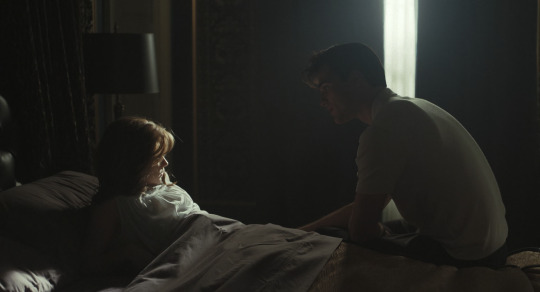
PRISCILLA – it was fascinating to see this oft-adapted story through new eyes. Where 2022’s Elvis is loud and frenetic in true Baz Luhrmann style, this one is quiet and harrowing. While I generally don’t get the hype behind Sofia Coppola’s biggest works, I appreciated her objective approach towards a complicated love story less directors might treat in judgment. Cailee Spaeny is phenomenal in the titular role. And her subtle transition to adulthood blew me away. You know how, with some actors, it’s like they’re just playing dress up with wigs and make-up—like the trio at the end of Harry Potter? With Cailee, it’s like she really grew up years while filming.
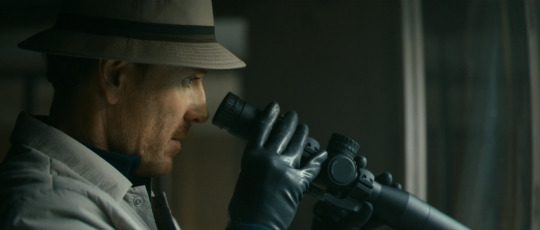
THE KILLER – the ending was underwhelming and it’s not up to par with David Fincher’s best works, but watch it for Michael Fassbender’s physicality, Fincher’s slick filmmaking and strange humor, and one very visceral fight scene.
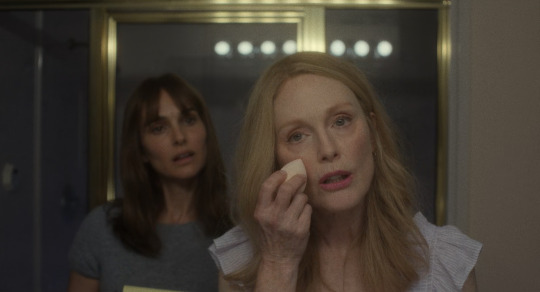
MAY DECEMBER – you feel almost voyeuristic and complicit watching this but you can’t look away. The performances are magnetic, the plot is fascinating however disturbing, and the tone is irresistibly campy—necessary to match the story’s sensational nature and to alleviate the constantly simmering tension. Who’s telling the truth? You never really know.
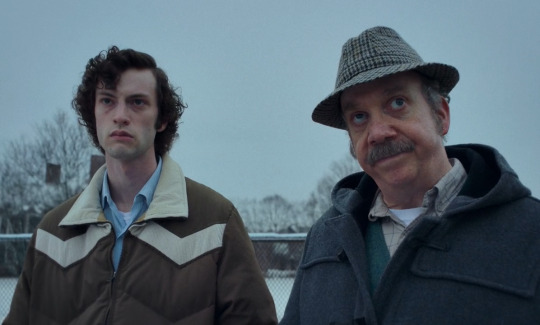
THE HOLDOVERS – they don’t make movies like this anymore. Funny, melancholic, and heartwarming, it has made its way—a cup of hot cocoa in hand—to my collection of cozy Christmas classics. Paul Giamatti is glorious in his role as a strict and sarcastic boarding school teacher who smells like fish. He’s not very nice but he is kind. Director Alexander Payne finds another diamond in the rough in Dominic Sessa. You would never know it was his first movie.

EILEEN – while Killers of the Flower Moon took forever and a day to finish, this one ended way too soon. I wanted more. This was like an extended universe for Thomasin McKenzie’s character in Last Night in Soho. But I’m not complaining. She’s fantastic. She could bring that character to a third movie and I’d still watch it—the same way I'd follow Mia Goth across the X franchise. Anne Hathaway as a blonde bombshell was giving Cate Blanchett in Carol and may it usher in a new era for her.
#movie recommendations#2023#monster#hirokazu kore-eda#priscilla#cailee spaeny#sofia coppola#the killer#michael fassbender#david fincher#may december#natalie portman#julianne moore#the holdovers#paul giamatti#dominic sessa#alexander payne#eileen#thomasin mckenzie#anne hathaway#film recommendations#2023 films
10 notes
·
View notes
Text
SOPHIE ELLIS-BEXTOR - "MURDER ON THE DANCEFLOOR" (2001) (2024)
youtube
23 years on and this groove's still got some life in it...
[7.11]
Thomas Inskeep: Sophie Ellis-Bextor should've been the next Kylie — and for a couple years, almost was. Her 2001 debut album Read My Lips spun off a trio of top 3 singles in the UK, including this one, which has over time become her true classic. Dua Lipa's entire career was birthed in this single, the dictionary definition of ebullient dance-pop. (It's fitting that Lipa's "Houdini" is currently the most-played song on UK radio as this single is re-ascendant.) SEB has never gone anywhere: she's still making music, touring (based on her 2022 Sophie Ellis-Bextor's Kitchen Disco (Live at the London Palladium), she still sounds great), and is now a DJ on BBC Radio 2. She just didn't become the massive pop star she deserved to be. Now, thanks to its placement in a climactic scene in Saltburn, her greatest single is getting its flowers, climbing back up to #2 in the UK (so far — my fingers are crossed it can make it that final notch higher). "Dancefloor" still sounds fresh, certainly fresher than the glut of '90s-sampling dance-pop dominating the UK charts. This single sparkles, SEB giving a knowing wink as she sings, especially on the line "gonna burn this goddamn house right down." She knows what she's doing here: making magic. [10]
Edward Okulicz: I bought this on single back in 2002, which tells you something (other than that I am old): it was an irresistible bit of sparkly disco radio pop back in the day. Move it forward or backwards a few years and it might have been an indie rock song for someone else, a filter house record, or (gulp) a Ronan Keating record. Fortunately that never occurred, and it's a delight to see a classic gain new fans from age groups and territories that didn't get it on saturation rotation. Part of it's the solid song by Gregg Alexander, who at his best was a master craftsman of a much-maligned form. Another part of it's the much nimbler, slinky production compared to the rest of his soft-rock oeuvre. And a very, very large part of it is the Debbie-Harry-but-English pose of Ellis-Bextor, too cool to do anything but be filmed dancing from the waist up while she stomps her heel into your eardrums. "Murder" really has everything — a catchy chorus, the tinniest guitar solo ever, hooks that fall as much off the words as the melody — and so is perfect for every occasion, even a movie I am never, ever going to see. [10]
Alfred Soto: Like the Pet Shop Boys' "Rent," waaayyyy too good for Saltburn — perhaps Emerald Fennell thought their incandescence would rub off on her as if it were glitter. Part of a vanished climate of French house-inspired crossover pop like Kylie Minogue's "Love at First Sight," Sophie Ellis-Bextor presages Katy B's regular-person anonymity: she surveys the strings and rhythm guitar licks like a party hostess keeping an eye on the band while sipping her prosecco. [8]
Alex Clifton: I haven't seen Saltburn and frankly have no interest in it, but this film has led to the Sophie Ellis-Bextor renaissance which is a net good for society. "Murder on the Dancefloor" is just brilliantly composed and produced; it feels as fresh today as it did twenty years ago. There are so many thrilling little moments from Ellis-Bextor's vocal delivery: the way her voice curves into "about your kiiiiiind," the little rasp in "there may be others," the little trill of "dancefloor" in the bridge. I feel so biased writing this review because I've literally been listening to this song since I was a kid, but I'm so jazzed about "Murder" finally receiving the love it deserves. [10]
Ian Mathers: How can you not love pop music when it'll randomly do things like this, suddenly giving us a song to review from before the earliest days of the Jukebox, that is here purely because of its use in a movie that I have not seen but am informed was probably picked on the basis of Ellis-Bextor's plot arc in the music video. And if I'm not willing to go to bat for it quite as hard as I would for "Running Up That Hill," I did love "Murder on the Dancefloor" in 2001 and it still sounds great now. I don't find myself having any reaction more complicated than happiness at hearing it again and that particular joy of people liking something you like. [8]
Nortey Dowuona: If you told me this came out in 2021 and Emerald Fennell asked Sophie to use it in her movie set in 2001 because it was just that on point in depicting the time, I would agree. Then after taking out my phone, I'd be punched in the face and meekly give up my phone. Then, after watching you sprint into a nightclub, I'd immediately thank goodness you didn't ask for the passcode and run like hell for the closest subway. I am three stops from home before I remember this did not actually come out in 2021; there are other Sophie Ellis-Bextor songs and jailbreaking is a thing now. [10]
Leah Isobel: RIP Mark Fisher. You would've written a hell of a blog post about Saltburn. [7]
Mark Sinker: Necessary digression 1: heraldry as a science in Europe is roughly 900 years old, a bright and stylised easy-read guide, highly rule-bound and policed, to class and land and title — which is to say to material history (its jargon-field is still mostly words not otherwise used in the UK since the 14th century; even property law is less lousy with extinct Norman French terms). And like many very aged things, it has necessarily also passed through phases and fashions, as technologies of display arrive and depart. In fact the first inkling I had that I wasn’t going to get on with Saltburn was the typeface chosen for the title on-screen at the outset. It’s a font with a fairly specific ill-set ungainliness to it: it wants to have the weight of "pleasingly and weirdly old; not how we do things now," but it might just as well be some off-the-peg super-modern studio confection — or even (though I slightly doubt this) something custom-fashioned purely for the film. There’s no discernible care to the choice. Necessary digression 2: back in the late '70s when Peter Saville was busily and insouciantly borrowing from this or that actual-real document or design, of such-and-such era, part of the point was the severity of the decontextualisation — except there was a rigour to the carelessness. The item was being supplied with an iconicity (the very word) pulling you in towards whatever the item was that Factory Records was then placing on the market. The surface glamour of the original was to be funneled through in such a way that its weight amplified only the new relationship. In fact (in its stylised easy-read way) Saville’s work was ruthlessly the opposite of heraldry, so very good at managing the ambient melancholy that suffuses the wider Factory moment; all the blocks and counterspells necessary to conjure here beyond the end of creative time as the context for the music to have presence. Anyway, long story short (lol) Saltburn – which would love to believe it has accessed the aura, for example, of the cover of New Order’s Technique — is attempting to juggle the same double burden. It wants to conjure a play between the decontextualised pull of 24-hour-party-people hedonism and the real ineluctable unremovable weight of actual history and actual class and actual land and actual title. Except for its story to work it needs both dimensions (hedonism and weight; heraldry and careless scribble) to register, as Saville absolutely didn’t. No block, no counterspells, nothing to dampen the disturbances — so when poor old Sophie EB’s voice and poise are scalpeled out of their 20-year-old chart context and abruptly c/p-ed into whichever late-stage scene it is, well, here they are, as a clumsy synopsis (calculation, side-eye, dancing, death) the structure really shouldn’t require, in a role the song is the wrong mood (a faintly gauche trifle, a chirpy hustle) to deliver. The movie never works out where it gets its deep reveal from, or what shape its politics are (if politics is even a useful word here). Ill-set ungainliness all over again: the carelessness floods back into the borrowed adornment, and breaks it in pieces. I don’t even love this song that much but I hate how it gets what value it has so gracelessly driven out of it. [2]
Jacob Satter: At the risk of killing the groove, this is a pretty boring choice for a manufactured revival track. Call me back when the kids discover "It's In Our Hands." [4]
Jacob Sujin Kuppermann: I'm glad everyone's having fun here but the more I try to enjoy this — either on its own terms or as an icon of nostalgia — I get nothing. Unremarkable in any year. [4]
Lauren Gilbert: It was a [10] in 2001, it's still a [10] now. [10]
Katherine St. Asaph: The thing about it being 2024 is that in the intervening 20-plus years since "Murder on the Dancefloor" came out, approximately ninety million more disco-revival tracks came out. Some of them are by Sophie Ellis-Bextor, even. And so many of those tracks are smooth where this is stiff, magisterial where this is timid (and not in a winsome Katy B kind of way; Katy got better arrangements), charged where this is inert and just generally unmurderous. It's actually startling how inessential this sounds by comparison. [3]
Oliver Maier: Even as a youth, before my brain was burdened with indulgent critical vocabulary, I felt like this song just didn't work. I can't pin down whether "Murder" is knowingly a little chintzy (dare I say camp?) or if it's just cheap tat trying sincerely to sound boutique. Benefit of the doubt granted or not, Ellis-Bextor sounds like she's doing karaoke off the sofa. [4]
Michael Hong: When Ellis-Bextor pauses, it's easy, like a quick and graceful end to a conversation rather than the expectant response to her more spirited word choice. She's committed to this casualness, easily slipping away at the hint of a faux pas, which makes the occasional lingering word more charming. "About your kind," she sings, as if looking you up and down, wondering if she's got it wrong this time; the word "others" is trailed as if she's daring you to eliminate the competition. In that way, "you better not kill the groove," delivered with such nonchalance, becomes a fervid instruction. [7]
Will Adams: It's cute, Sophie is ever-charming, but there's real problem when you've got songs in your catalog with titles like "Bittersweet" and "Heartbreak Make Me a Dancer" that offer way more palpable drama than the one with the word "Murder." [5]
Joshua Minsoo Kim: Every other line is threatening here. “Stay another song,” “Don’t think you’ll get away,” “You better not kill the groove.” Sophie Ellis-Bextor isn’t demanding fear, though. That’s what makes “Murder on the Dancefloor” so irresistible: she sounds like a friend, albeit one who’s deathly serious about having a good time. When you hear her, you believe it can be this good for you too. [8]
Taylor Alatorre: Wow. They were allowed to make these slick disco-pop reimaginings with actual guitar solos back then? We must retvrn. [8]
Tara Hillegeist: It feels like a time capsule from another era in pop music entirely, because it is. There was a time when Ellis-Bextor's stately, imperial, nigh-inhuman precision of a delivery felt like nothing so much as the edifice within which pop star royalty could be crowned, particularly in the world of UK pop; it's still hard, even now, to deny the simple pleasures of someone who knows what her job is and then executes it flawlessly. But it's been over two decades since this song originally bowed, and it must be said that it was the impact of songs like, yes, "Murder" itself that raised pop music's skill floor high enough that such icy professionalism now feels like the most tiresome part of it — Dua Lipa does this regularly, after all, and with equal anonymity. No, what saves it, and ensures the song remains nothing so much as a delightful diversion (conditions of its resurgence be damned, I say), are the sampled whoops that come in beneath the guitar solo; notwithstanding that such a slice of controlled disco can credit itself with having a guitar solo to begin with, but the canned hype is such a stupendously goofy touch. It humanizes the song instantly, stripping the archness of its artifice aside to reveal the awkward smile underneath. The moment passes, of course. But the smile lingers. [7]
Anna Katrina Lockwood: I've been waiting 20+ years for an opportunity to issue a dissertation on the songwriting genius of Gregg Alexander and by god am I ready. Though it's hard to imagine it in a different form, "Murder on the Dancefloor" was apparently a cast-off single for Alexander's New Radicals debut, replaced by the equally glorious "You Get What You Give" — like, imagine being such a talented songwriter that you can just cast off a song like this, knowing you've got an equally great one to replace it with! "Murder on the Dancefloor" is just perfection in Ellis-Bextor's hands, with a galaxy of terrific choices in its production to go along with the amazing melodic structure. I still can't help but burst out laughing at the initial vocal hit in the intro on occasion, a perfect, delicately harmonized coo of "Murder!," cutting through the disco instrumental setup occurring all around. It's as great a moment of pop songwriting as I'm aware of — setting the expectation of the song's vibe from the outset. Ellis-Bextor's lyrics are outstanding, cleverly arch but not too shiny, in the thick of it yet also gliding past suavely. The song is incredibly detailed, a carefully calibrated piece — it lopes by with a relaxed stride rather than a reckless dash, a well-tailored Savile Row suit as opposed to an H&M tunic, cut to the millimeter. Yet it's also very clearly of the disco, built for singing along, difficult to avoid dancing to when it comes on. It turns on its heel at moments' notice, with layers of melody playing off each other throughout. Matt Rowe's efforts in production also deserve notice — this song sounds great, so distinctive that it is still eminently listenable 23 years on. I honestly have not a single thing to criticize about "Murder on the Dancefloor," and it's been a long time that I've considered it to be one of the truly great pop songs of my lifetime. It feels like incredibly just desserts to see it garnering so much praise now. [10]
[Read, comment and vote on The Singles Jukebox ]
#sophie ellis-bextor#saltburn#music#pop#pop music#music writing#music reviews#music criticism#the singles jukebox#Youtube
7 notes
·
View notes
Text
Poor Things Review
What was good: Sets, great. Costumes, very well done. Actors, clearly put their all into the performance. This feels like a movie a lot of critics will love. I've already seen it put in top 10 lists. And honestly? Ok. If this is your favorite movie, shit is subjective, so on. I can tell this was a movie that was specifically written to be uncomfortable. There is a scene implying children watching sex between two 'adults', like. I understand this movie is not attempting anything feel good. It's meant to be weird and odd and a black comedy, like that's not lost on me at all. That being said. I hated this movie. First of all. It's creepy. (it's supposed to be I KNOW), in a way this movie goes out of it's way to be weird and surreal so the subject matter itself sort of blends in with the other weirdness. It's odd and artful and that in a way... balances the premise. But, I'm sorry. The main lead is a baby. She's a toddler. She is a toddler in a grown woman's body. And they make it clear that 'she is neither the mother or the baby'. And. Okay. You know what that sounds like. That 5,000 year old Loli. Oh, she may look like a child, but she's old actually.
Listen. You can say all you want, 'she's a new being, she's different'. But they make it very clear. They put an infant's brain into a woman's body. That's all they did. And then they show sex scene after sex scene with her. Sex, sex, sex, then she becomes a sex worker. And they shove it off as a sex positive empowering thing. Like, hey, she's her own person, she deserves to use her body as she sees fit! Cool. Still a toddler. Still a toddler. STILL A TODDLER. I'm sorry, this was nightmare movie, if it had even half of a soul, would have focused on the horror of the subject matter. I don't care that the deadpan delivery and absurdity was intentional. I don't care that it was meant to be odd on purpose and say something larger about freewill and the human condition and god or sexuality. It was fucking demented.
I don't care how 'clever' it is. How 'good' it looks. The baby of a suicidal woman is in the body of her mother. Aging her up super fast and making her a robotic thing that learns for the plot to make it less creepy when she has sex over and over again is fucking weird. Sorry. This should have been a horror movie. It should have been directed by a woman. This movie is fucking awful. Well acted? Sure. Good looking? Yes. I'm sure there'll be critics enjoying it a lot and saying while the premise is indeed disturbing, it's more of a way of showing the progression of growing up in this world and philosophy or whatever.
Look, I try not to moralize movies. They're movies and fictional for a reason. I think Mysterious Skin is really good, Saltburn was entertaining. I'm not a weird prude that 'doesn't get it'. I just hate this movie. There it is.
9 notes
·
View notes
Note
I’d love to hear your thoughts on promising young woman?
It’s been however many years since I’ve seen it but that one’s even more frustrating than saltburn, because the set up was actually well done, and then she absolutely bombed the ending. I remember reading somewhere that the scene where Carey Mulligan is murdered is exactly as long as it takes to suffocate someone, which, idk maybe it’s a poignant idea in better hands, but I remember wondering who the fuck that was for. No one sitting down to watch a rape revenge flick is unfamiliar with the idea of violence against women. It felt needlessly gruesome, and only put there there to “cleverly” subvert the expectations that come with a rape revenge film. But again, WHY? Who for??? Why would anyone want to see that??
And that’s before you even get into the actual ending where after painstakingly setting up all the reasons a college institution failed her friend after she was raped, Emerald Fennell tells us it’s okay Carey Mulligan fucking died without anyone getting any sort of justice because the police will handle it???? You know how the police are famously sympathetic to abused women. Ma’am, how out of touch can you fucking be??
I think Emerald Fennell has this idea in her head that movies have to have a CrAzY tWiSt, which is why her endings are so confounding. But it’s why I keep going back to this idea that she doesn’t really have anything to say. She doesn’t seem to understand that a good twist is supposed to make sense thematically, because she doesn’t know or care what the politics of her films are actually saying, because she has nothing she truly wishes to express to an audience other than “look at my clever movie!!” She’s only writing her endings like that because she’s trying to smugly trick her audience like: oh you thought it was gonna be this, well it’s gonna be something else instead!! And that something else is invariably worse. (And honestly, her set ups only work, because she coasts off the expectations of the genre that have already been perfected by those before her).
#and I don’t think I even rated it as low at the time#because the potential was there#but it’s clear from saltburn that she has not learned anything from the criticisms of PYM#and so looking back at it now I feel much less inclined to give her grace#promising young woman#asks
8 notes
·
View notes
Text
SHORT PEOPLE GOT NOBODY
Opening in theaters today:
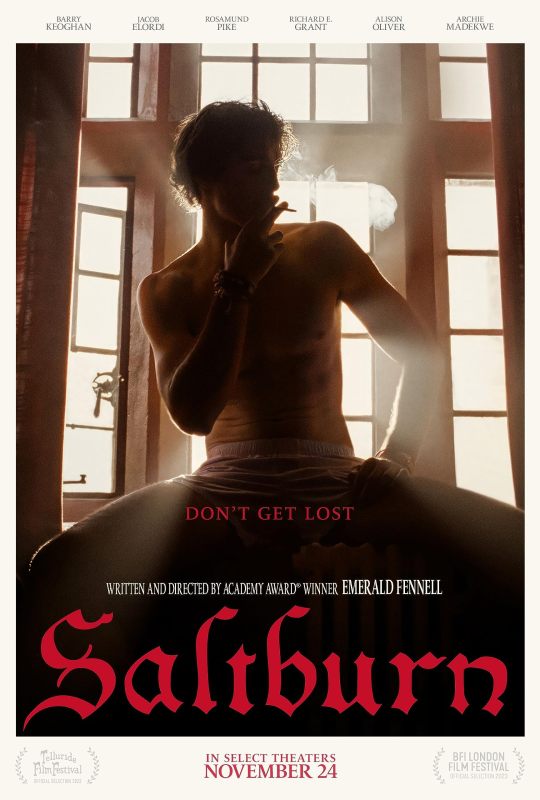
Saltburn--The title refers to the enormous, somewhat faded English country mansion in which most of the movie unfolds. But it may also suggest the proverbial pain of salt poured into a wound, as might be caused by the very sight of such a residence and the class system it represents.
Oliver Quick (Barry Keoghan), a slight, nebbishy scholarship student to Oxford, is befriended by a classmate, the blueblood Adonis Felix (Jacob Elordi), who invites him home for the summer to the title pile of bricks in 2007. Felix's family is a fairly gothic bunch--abstracted Dad Sir James (Richard E. Grant), blithe, cordial Mom Lady Elsbeth (Rosamund Pike) and addled wreck of a sister Venetia (Alison Oliver), along with the sneering biracial American cousin Farleigh (Archie Madekwe). Carey Mulligan is also around as Elsbeth's nutty parasitical friend Pamela, as is Paul Rhys as the imperious butler Duncan.
Rather quickly, Oliver finds himself enmeshed with each of the family members, and drawn into the intrigues and occasional casual decadence of their isolated and mysterious lifestyle. While Oliver initially seems like an honest but in-over-his-head parvenu, like Balzac's Rastingnac or Faulkner's Ben Quick, we gradually see that he has his own wormy, calculating, opportunistic side.
This is the second feature written and directed by Emerald Fennell of 2020's Promising Young Woman. If it's a sophomore slump, that probably says more about the incisive brilliance and focus of Promising Young Woman than it does about any shortfalls of its own. The fury that charged Fennell's first film was direct and uncomplicated. Seemingly wanting to get across something more subtle and nuanced about class, Saltburn flails around a bit and sometimes feels confused, overwrought, overlong, even borderline campy.
But stick with it. It ultimately adds up to a potent piece of moviemaking, and of storytelling. Shot with hallucinatory garishness by the marvelous Linus Sandgren, the movie brings its setting vibrantly to life; there's none of the comforting stodginess of, say, Downton Abbey to it. And Fennell's narrative is involving. Even as we sense the influence of everything from The Shining to Risky Business, we're also pulled into investment in a yarn we haven't seen before. And she doesn't let us down; despite the movie's gratuitous thrashing about, in the end the plot snaps together to a satisfying and fairly devastating point.
Fennell also gets uniformly superb performances from her cast. Probably the wittiest and most endearing is Rosamund Pike, but Barry Keoghan, maybe the single best thing about The Banshees of Inisherin, is spectacular here, giving a tour de force turn in a role that is not only wildly mercurial on an emotional and psychological level, but also required physical fearlessness. Saltburn may end up being most remembered for literalizing a common expression for finding somebody extremely attractive, but Keoghan's draining performance makes a splash.
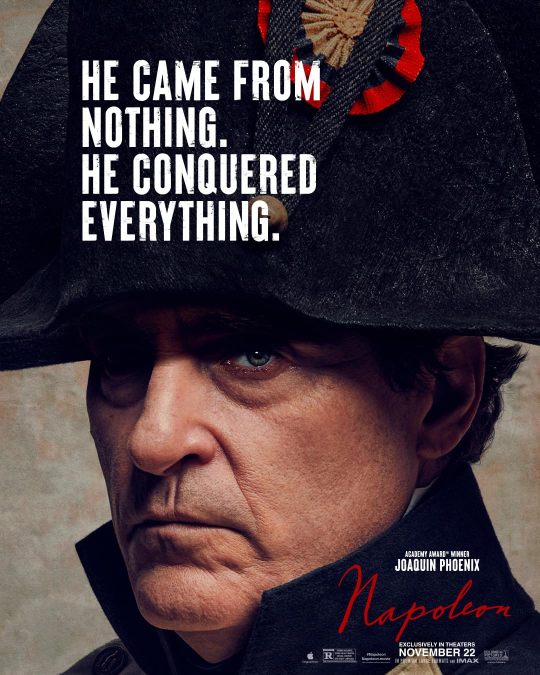
Napoleon--Returning to France, uninvited, from exile in Elba, the title character is confronted with a regiment of soldiers he used to command. "I missed you," he tells them, seemingly sincerely. Soon he's back in charge.
Apparently there is some historical basis for this scene; Napoleon is said to have had a fond and comradely relationship with his troops, despite his willingness to get them slaughtered. But to the casual viewer of this Ridley Scott epic, the moment may come as a surprise. Nothing in the movie prepares us for it. Played by Joaquin Phoenix, this Napoleon shows little affection or even interest toward anyone or anything apart from himself, and a certain almost adolescent erotic fixation on Josephine (Vanessa Kirby). In between campaigns, he makes rather unromantic attempts to impregnate her, and reacts with sullen outrage when they don't succeed.
Scott's movie, based on a script by David Scarpa, is largely a pageant of carnage. It begins with a graphic depiction of Marie Antoinette's meeting with Madame Guillotine, then shows us Napoleon navigating the deadly mayhem of the Revolution and the First Republic. It then traces him from battle to battle: Toulon, Austerlitz, Moscow and some of his other greatest hits, culminating, of course, against Wellington (Rupert Everett) at You-Know-Where.
This Napoleon isn't boring. It's entirely watchable and well-staged. Scott deploys his forces with the care of a child playing with toy soldiers on his bedroom floor. But it doesn't really hit hard emotionally; something is missing from it. Early on, we see a cannonball splat into the chest of a horse, and the resulting explosion of gore is so obviously computer-generated that, for me at least, it carried little shock (it has this in common with the splatter effects in Thanksgiving, which, exhaustingly enough, I saw the same day). This sort of detached unreality hangs over the movie's horrors, and the same detachment extends to the central character.
While Phoenix holds our attention with his movie star charisma, it's as if he's working in a vacuum. Except here and there in his scenes with Kirby's drolly unflappable Josephine, Phoenix seems to be anomic, walled off from the other characters by his own narcissistic self-regard. Maybe that's deliberate; maybe Scott is trying to dramatize the Napoleon of Walter de la Mare's unforgettable poem:
What is the world, O soldiers?
It is I.
I, this incessant snow,
This northern sky.
Soldiers, this solitude
Through which we go
Is I.
In any case, the movie has a point to make about the appetite for an autocratic "strongman" leader that seems to inevitably arise in reaction to the messiness of democratic movements. It's a theme which would, admittedly, seem to have a slight smidge of relevance to our current times. It should be noted that, warmongering megalomaniac though he was, Napoleon was also a tremendously intelligent and curious person, which puts him in a very different category than our most notable current would-be Emperor.
#napoleon#saltburn#emerald fennell#barry keoghan#rosamund pike#jacob elordi#archie madekwe#alison oliver#joaquin phoenix#ridley scott#vanessa kirby#rupert everett#linus sandgren#promising young woman#carey mulligan#richard e grant
7 notes
·
View notes
Text
do you ever think about why felix was so susceptible to oliver's lies and manipulation in the first place? like the easy take-away answer is because he's a spoiled rich boy raised in an insular environment with little real world experience. but i think it's because of his relationship with elspeth. obviously the cattons are dysfunctional and all of their relationships and dynamics as well as boundaries with one another are blurry. farleigh, venetia and felix are all unusually close. i think it's because felix had also been at the receiving end of elspeth's manipulation and as oliver put it in one scene, "emotional blackmail" for many years already. all oliver's red flags are just like furniture to felix, something unobtrusive because it's nothing he hasn't seen before.
we learn from our parents and we know that elspeth likes her little charity pet projects, i.e poor dear pamela. felix has seen this charade of taking someone down on their luck in multiple times only to cast them aside once they start losing their novelty and the voyeuristic trauma porn is no longer interesting, and he started to repeat this behavior with eddie (presumably) and then oliver.
"don't bang on about it, pamela, darling." i think felix has a rudimentary understanding of how awful elspeth is because of the exchange in the library when she talks about having a fear of ugliness ever since she was young, not knowing why, and felix says "because you're a terrible person?" "don't be mean!" and there's truth to every joke. elspeth is a narcissist. this is another easy one. she's very harsh and judgemental of everyone and her kids aren't exempt from this. she's especially harsh on venetia with how quickly and easily she tells oliver about all of her shortcomings. there are no boundaries within this family about what's pertinent information and what should be kept private.
we see this play out in the very same scene when they're discussing the extent of oliver's trauma and the very specific details of it and felix is the only one who seems to chide them for the behavior. "farleigh, that's private stuff." "you told me." "in confidence." i think felix knows that anything he says is going to be repeated and treated like salacious gossip, but i can't fault him for this too much when he's doing it to build a case for why oliver should come and stay with them. cut to elspeth singling oliver out near immediately to pry out the nitty gritty details of his trauma and to seemingly console him whilst also making it about herself. "i've lost so many friends to addiction. so many dear, dear friends." felix seems genuinely embarrassed and dismayed that his mum asked oliver so many intrusive questions. he knows his family is a dysfunctional freakshow, and i think he's careful not to tip oliver off about it too much lest he goes running, by waiting until oliver gets to saltburn to tell him about some of the rules. but it's all "relaxed."
obviously after felix's death, the cattons are still clinging on to any thin veneer of normalcy in the wake of their grief, but elspeth isn't even able to say anything flattering about her son. it still comes back to her somehow, with how stupid of a choice his middle name was but she'd never imagined she'd have to see it on a headstone. it's true that felix is allowed some level of protection and dignity in his death that the other cattons don't get, but only from oliver's point of view. elspeth doesn't allow him this. he was arguably the kindest (if not most naive) of them. we see some warmth from sir james, in shock and in denial as he calls felix his darling boy and tries to warm up his body. the cattons are all still clinging to the idea that this kind of thing doesn't happen to people like them, but their affluence hadn't been able to protect them for once. they made it so easy. spoiled dogs sleeping belly up.
#─── ⠀ ⠀ ⠀ * ⠀ ⠀𝐬𝐚𝐥𝐭𝐛𝐮𝐫𝐧.⠀ / ⠀ meta.#─── ⠀ ⠀ ⠀ * ⠀ 𝐟𝐞𝐥𝐢𝐱. / ⠀ essence.#/ not an eat the rich movie bc the rich are eating each other#/ anyway all of this to say . even if oliver hadn't done all that felix would've NOT made it out of that house or situation i dont think .#/ dead since the beginning etc etc
3 notes
·
View notes